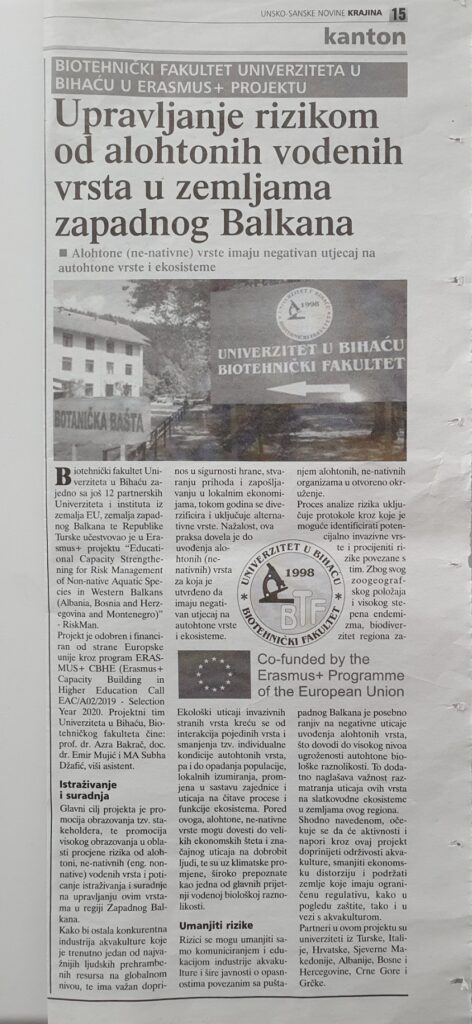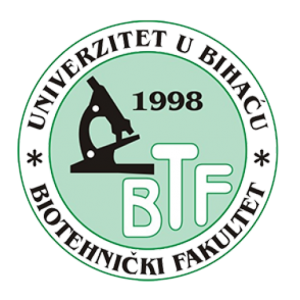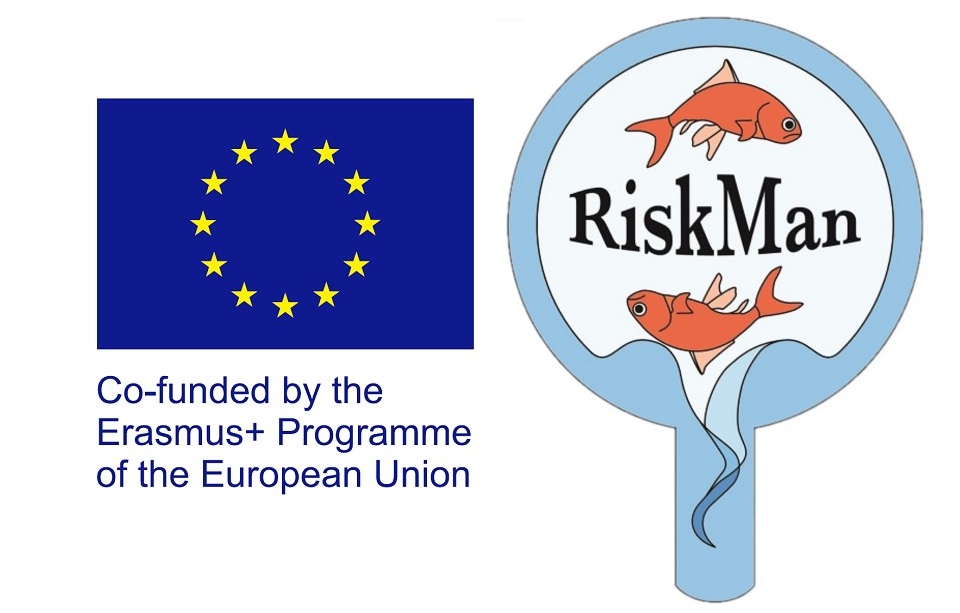
Erasmus+ project “Educational Capacity Strengthening for Risk Management of Non-native Aquatic Species in the Western Balkans (Albania, Bosnia and Herzegovina and Montenegro)” – RiskMan
Application No. 619384-EPP-1-2020-1-TR-EPPKA2-CBHE-JP / Duration: 2020-2022
more information about the project at:
Erasmus+ CBHE project RiskMan | Facebook
Copyright © BTF / Blog at UNBI (BTF) developed by Asst Prof. Emir Mujić
Disclaimer: The European Commission support for the production of this publication does not constitute an endorsement of the contents which reflects the views only of the authors, and the Commission cannot be held responsible for any use which may be made of the information contained therein. https://eacea.ec.europa.eu/sites/eacea-site/files/multilingual_disclaimers_for_beneficiaries.pdf
Podrška Europske komisije proizvodnji ove publikacije ne predstavlja potporu sadržaju koji odražava samo stavove autora i Komisija ne može biti odgovorna za upotrebu sadržanih informacija. https://eacea.ec.europa.eu/sites/eacea-site/files/multilingual_disclaimers_for_beneficiaries.pdf
Introduction
University of Bihać, Biotechnical Faculty together with 13 partners Universities and institutes from EU countries, Western Balkans and the Republic of Turkey took part in the Erasmus + project “Educational Capacity Strengthening for Risk Management of Non-native Aquatic Species in Western Balkans (Albania, Bosnia and Herzegovina and Montenegro)”- RiskMan. (ref. no. 619384-EPP-1-2020-1-TR-EPPKA2-CBHE-JP). The project was approved and funded by the European Union through the ERASMUS + CBHE program (Erasmus + Capacity Building in Higher Education Call EAC / A02 / 2019 – Selection Year 2020
The project team of the University of Bihać, Biotechnical Faculty consists of:
- Assoc Prof. Azra Bakrač, PhD
- Asst Prof. Emir Mujić, PhD
- MA Subha Džafić, senior Assistant,
- Nermina Badić – Office of Academic and Student Affairs at UNBI
Aims and objectives
The main aim of the project is to promote the education of stakeholders and high education in the field of risk assessment of non-native (NN) species and to stimulate research and cooperation on the management of NN species in the Western Balkan Region.
Aquaculture is currently one of the most important human food resources globally and is an important contributor to food security, income generation and employment in local economies. Nevertheless, in order to remain competitive, the aquaculture industry is diversifying over the years involving the use of alternative species. Regrettably, this practice has led to the introduction of non‐native (NN) species to natural water bodies that have been found to exert adverse impacts on native species and ecosystems. Ecological impacts of invasive alien species range from single-species interactions and reduction in individual fitness of native species to population declines, local extinctions, changes in community composition and effects on entire ecosystem processes and wider ecosystem function. Moreover, non-native species can lead to major economic damage and significant impacts on human well‐being and, along with climate change, are widely recognized as one of the main threats to aquatic biodiversity.
Given that risks can be reduced merely by communicating and educating industry and the general public to the hazards associated with the release of non-native organisms into the open environment, the risk analysis process involves protocols through it is possible to identify potentially invasive species and assess the risks associated with those. Due to its zoogeographical position and the high degree of endemism the Western Balkans region’s biodiversity is particularly vulnerable to the negative impacts of NN species introductions, leading to high levels of threat to native biodiversity. This further highlights the importance of considering the impacts of NN species in freshwater ecosystems in the countries of this region. Consequently, these efforts are expected to contribute to aquaculture sustainability, reduce economic distortion and support countries having limited regulation on both conservation and aquaculture issues.
Partners:
- Turkey (Coordinator): Muğla Sıtkı Koçman University
- Italy: University of Palermo
- Croatia: University of Zagreb
- North Macedonia: Ekomenlog
- North Macedonia: Hydrobiological Institute Ohrid
- Albania: ACEPSD
- Albania: ALB ADRIATICO 2013
- Albania: Agricultural University of Tirana
- Bosnia and Herzegovina: University of Sarajevo
- Montenegro: University of Montenegro
- Greece: iSea
- Bosnia and Herzegovina: University of Bihać
- Albania: University College of Business
_____________
Bosnian language
Erasmus+ projektu “Jačanje obrazovnih kapaciteta za upravljanje rizikom od alohtonih (ne-nativni) vodenih vrsta u zemljama Zapadnog Balkana (Albanija, Bosna i Hercegovina i Crna Gora)”
Uvod
Biotehnički fakultet Univerziteta u Bihaću zajedno sa još 12 partnerskih Univerziteta i instituta iz zemalja EU, zemalja Zapadnog Balkana te Republike Turske uzeo je učešće u Erasmus+ projektu „Educational Capacity Strengthening for Risk Management of Non-native Aquatic Species in Western Balkans (Albania, Bosnia and Herzegovina and Montenegro)“ – RiskMan. (ref. no. 619384-EPP-1-2020-1-TR-EPPKA2-CBHE-JP). Projekat je odobren i financiran od strane Europske unije kroz program ERASMUS+ CBHE (Erasmus+ Capacity Building in Higher Education Call EAC/A02/2019 – Selection Year 2020:
Projektni tim Univerziteta u Bihaću, Biotehničkog fakulteta čine:
- prof. dr. Azra Bakrač,
- doc. dr. Emir Mujić,
- MA Subha Džafić, viši asistent,
- Nermina Badić – Ured za nastavu i studentska pitanja na UNBI
Cilj projekta
Glavni cilj projekta je promocija obrazovanja tzv. stakeholdera, te promocija visokog obrazovanja u oblasti procjene rizika od alohtoni, ne-nativnih (eng. non-native) vodenih vrsta i poticanje istraživanja i saradnje na upravljanju ovim vrstama u regiji Zapadnog Balkana.
Kako bi ostala konkurentna industrija akvakulture koje je trenutno jedan od najvažnijih ljudskih prehrambenih resursa na globalnom nivou, te ima važan je doprinos u sigurnosti hrane, stvaranju prihoda i zapošljavanju u lokalnim ekonomijama, tokom godina se diverzificira i uključuje alternativne vrste. Nažalost, ova praksa dovela je do uvođenja alohtonih (ne-nativnih) vrsta u za koja je utvrđeno da imaju negativan utjecaj na autohtone vrste i ekosisteme. Ekološki uticaji invazivnih stranih vrsta kreću se od interakcija pojedinih vrsta i smanjenja tzv. individualne kondicije autohtonih vrsta, pa i do opadanja populacije, lokalnih izumiranja, promjena u sastavu zajednice i uticaja na čitave procese i funkcije ekosistema. Pored ovoga, alohtone, ne-nativne vrste mogu dovesti do velikih ekonomskih šteta i značajnog uticaja na dobrobit ljudi, te su uz klimatske promjene, široko su prepoznate kao jedna od glavnih prijetnji vodenoj biološkoj raznolikosti.
S obzirom da se rizici mogu umanjiti samo komuniciranjem i edukacijom industrije akvakulture i šire javnosti o opasnostima povezanim sa puštanjem alohtonih, ne-nativnih organizama u otvoreno okruženje. Proces analize rizika uključuje protokole kroz koje je moguće identificirati potencijalno invazivne vrste i procijeniti rizike povezane s tim. Zbog svog zoogeografskog položaja i visokog stepena endemizma, biodiverzitet regiona Zapadnog Balkana je posebno ranjiv na negativne uticaje uvođenja alohtonih vrsta, što dovodi do visokog nivoa ugroženosti autohtone biološke raznolikosti. To dodatno naglašava važnost razmatranja uticaja ovih vrsta na slatkovodne ekosisteme u zemljama ovog regiona. Shodno navedenom, očekuje se da će aktivnosti i napori kroz ovaj projekat doprinijeti održivosti akvakulture, smanjiti ekonomsku distorziju i podržati zemlje koje imaju ograničenu regulativu, kako u pogledu zaštite, tako i u vezi s akvakulturom.
___________________
Final conference, Mugla (Turkey) 11/09-15/09/2022
Published on October 3rd, 2022
As a part of the Erasmu+ CBHE RiskMan project project final conference was held in Mugla (Turkey) in period 12/9-15/9 of 2022. The final conference, as a project participant from the University of Bihać, was also attended by prof. Azra Bakrač. At the conference, the results of the project were presented, as well as all the activities that were carried out as part of the project. Prof. Azra Bakrač presented the results of pilot testing on invasive species in BiH. As a result of the pilot testing in BiH, very significant facts were observed regarding the issue of invasive species in the territory of BiH, namely: the concept of invasive species is almost unknown among the local population of BiH, very little attention is paid to this issue, the legislation on the issue of invasive species differs in different parts of BiH, and the most common invasive species in the area of BiH detected by the local population are babushka, crayfish, sunfish, perch, dropsy.In addition to these activities, a presentation was held at the conference regarding the three new syllabuses, as one of the results of the project. These syllabuses will be incorporated into the new study program of the II study cycle of the Biotechnical Faculty, department Engineering in Environmental Protection.
U periodu od 12.09.-15.09. 2022. godina održana je finalna konferencija u Mugli (Turska) Erasmu+ CBHE RiskMan projekta. Finalnoj konferenciji, kao učesnik projekta sa Univerziteta u Bihaću, prisustvovala je i red. prof. Azra Bakrač. Na konferenciji predstavljeni su rezultati projekta, kao i sve aktivnosti koje su urađene u sklopu projekta. Prof. Azra Bakrač je na konferenciji predstavila rezultate pilot testiranja po pitanju invazivnih vrsta na području BiH. Kao rezultat pilot testiranja u BiH uočene su vrlo značajne činjenice po pitanju problematike invazivnih vrsta na području BiH, a to je da je pojam invazivnih vrsta gotovo i nepoznat među lokalnim stanovništvom BiH, da se vrlo malo pažnje pridaje ovoj problematici, da se legislativa po pitanju invazivnih vrsta razlikuje u pojednim dijelovima BiH, te da su najčešće invazivne vrste na području BiH koje je detektovalo lokalno stanovništvo babuška, signani rak, sunčanica, smuđ, vodena kuga. Između ostalih aktivnosti, na konferenciji je održana i prezentacija po pitanju silabusa, a tri nova silabusa kao jedan od rezultata projekta bit će inkroporirana u novi studijski program na II ciklusu studija Biotehničkog fakulteta pod nazivom Inženjerstvo u zaštiti okoliši.
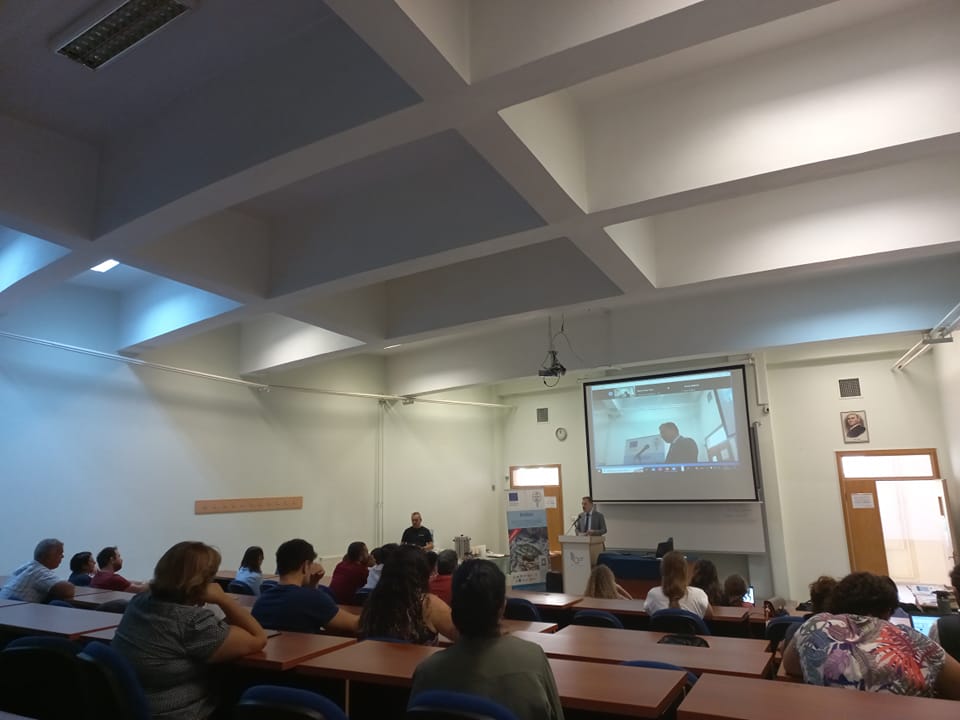
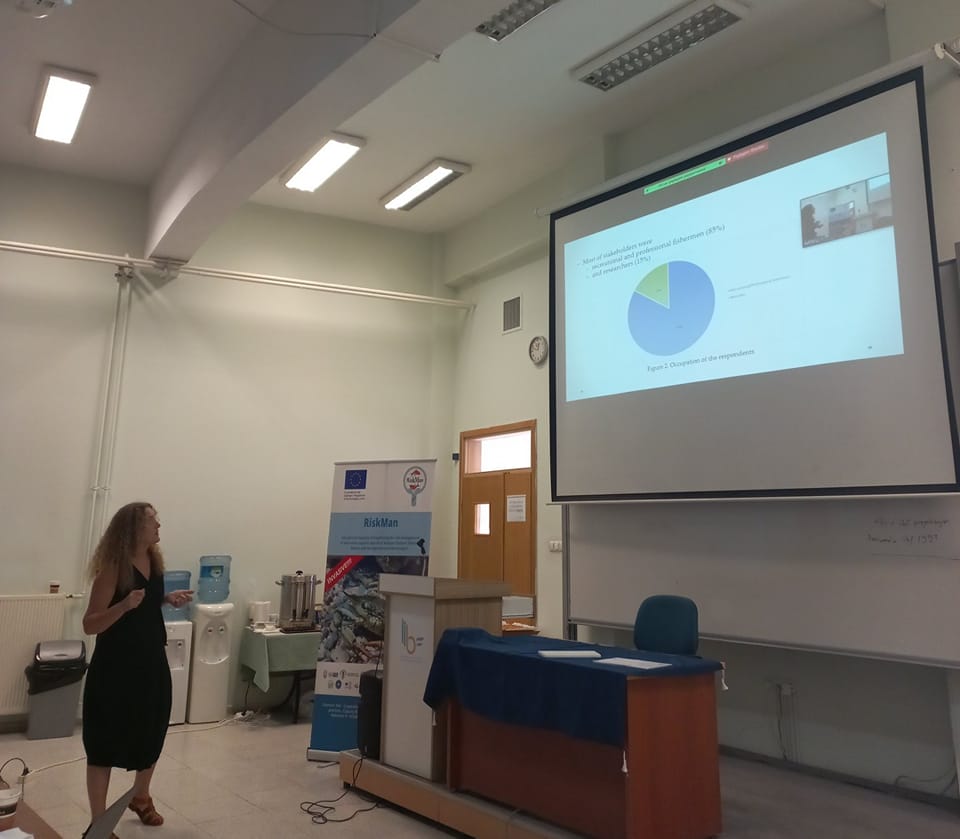
_________________________
Erasmus+ RiskMan Balkan Tour
21-27 August, 2022, Kotor, Tirana, Ohrid
Published on September 5th, 2022
In the period from August 21 -27, 2022, Assoc Prof. Emir Mujić and Prof. Azra Bakrač from UNBI RiskMan team participated in the Erasmus+ RiskMan Balkan Tour. During the tour, several meetings were held in Kotor, Tirana and finally in Ohrid. Realization of these meetings is linked to the successful implementation of the WP3, WP4 and partially WP7 of the Project Proposal.
U periodu od 21. do 27. augusta 2022. godine van. prof. Emir Mujić i red. prof. Azra Bakrač učestvovli su na Erasmus+ RiskMan Balkanskoj turneji. Tokom ove turneje održano je nekoliko sastanaka u Kotoru, Tirani i Ohridu, a njihova realizacija je povezana sa uspješnom implementacijiom WP3, WP4 i djelimično WP7 radnim paketima projekta.
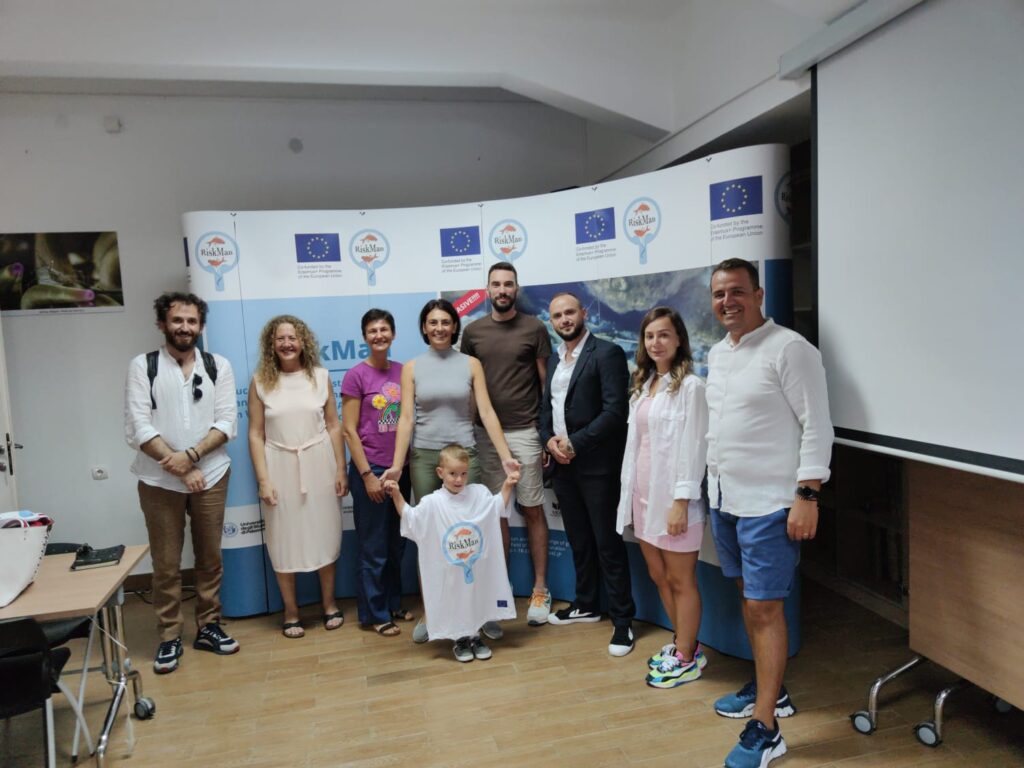
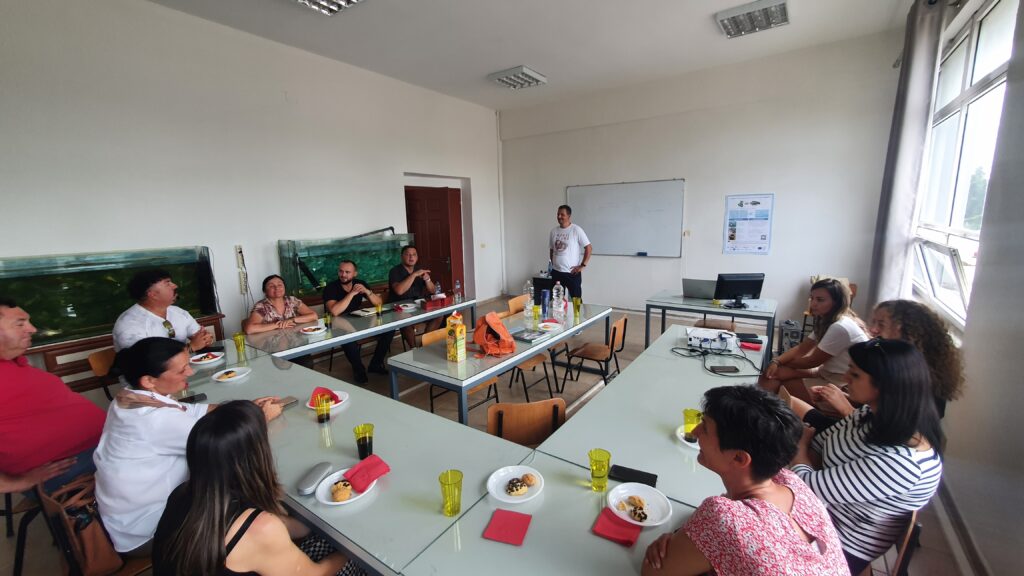
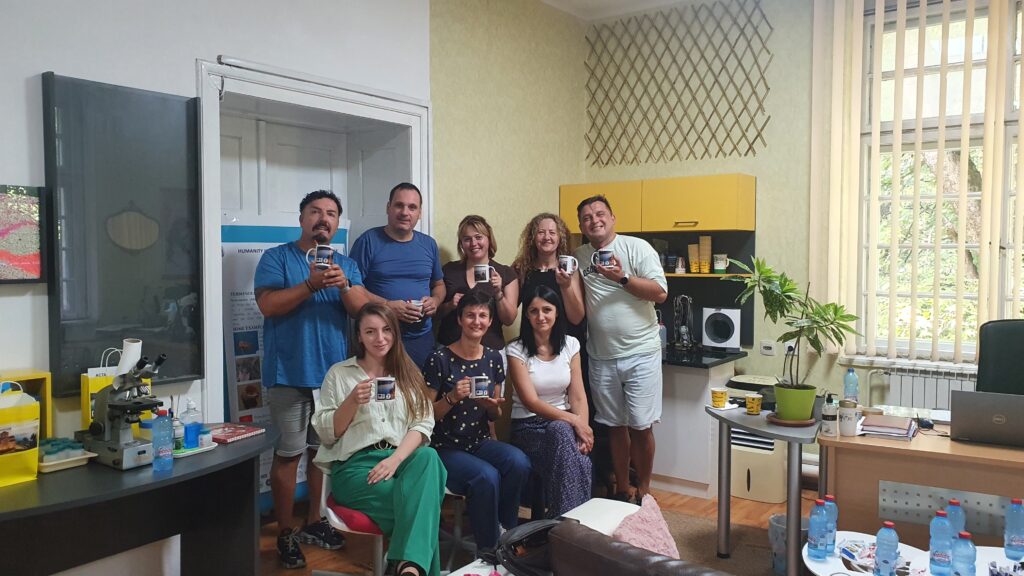
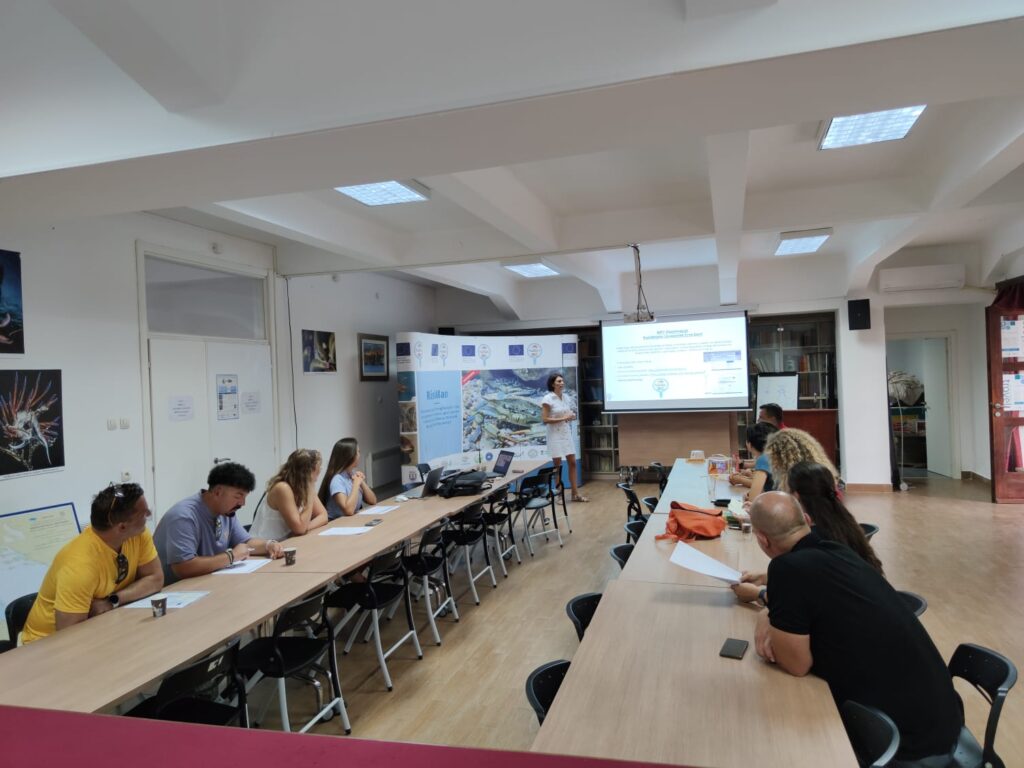
_________________________
ASK-ISK and Maxent Hybrid Workshop
Trilateral meeting: UNBI – UNSA – UNZG
Bihać (Bosnia and Herzegovina) – 22/07/2022
Posted on July 22nd, 2022
As part of the Erasmu+ CBHE RiskMan project on 07/22/2022 Hibryd workshop was held in Bihać on tools for assessing the risk of invasive species. The one-day training was attended by students, project participants from the University of Bihać, stakeholders – professional and recreational fishermen, and representatives from NP UNA. One of the lecturers was respected professor Samir Đug (Faculty of Science and Mathematics in Sarajevo) who decisively presented the work in the Maxent software program to the workshop participants. Workshop participants also had the opportunity to learn about another software program ASK-ISK, and the lecturer for this software program was M.sc. Ivan Špelić, who presented the influence of climate factors on the distribution of invasive species using the ASK-ISK software program. As part of the workshop, a discussion was opened by local fishermen, who conveyed the real situation and problems regarding invasive fish in the rivers in the USK area. The workshop ended with a visit to the laboratories at the Biotechnical Faculty, where the equipment provided by this project is located.
U sklopu Erasmus+ CBHE RiskMan projekta 22.07.2022. godine održana je radionica u Bihaću po pitanju alata za procjenu rizika invazivnih vrsta. U jednodnevnoj obuci sudjelovali su studenti, učesnici projekta sa Univerziteta u Bihaću, profesionalni i rekreativni ribolovci, te predstavnici iz NP UNA. Kao jedan od predavača bio je uvaženi profesor Samir Đug sa Prirodno-matematičkog fakulteta iz Sarajava, koji je učesnicima radionice decidno predstavio rad u softverskom programu Maxent. Učesnici radionici su također imali priliku upoznati se i sa drugim softverskim programom pod nazivom ASK-ISK, a predavač za ovaj softverski program bio je Mr.sc. Ivan Špelić, koji je pomoću softverskog programa ASK-ISK predstavio uticaj klimatskih faktora na distribucija invazivnih vrsta. U sklopu radionice otvorena je i diskusija od strane lokalnih ribolovaca, koji su prenijeli stvarnu situaciju i probleme po pitanju invazivnih riba u rijekama na području USK. Radionica je završena posjetom laboratorija na Biotehničkom fakultetu u kojima je i smještena oprema nabavljena ovim projektom.
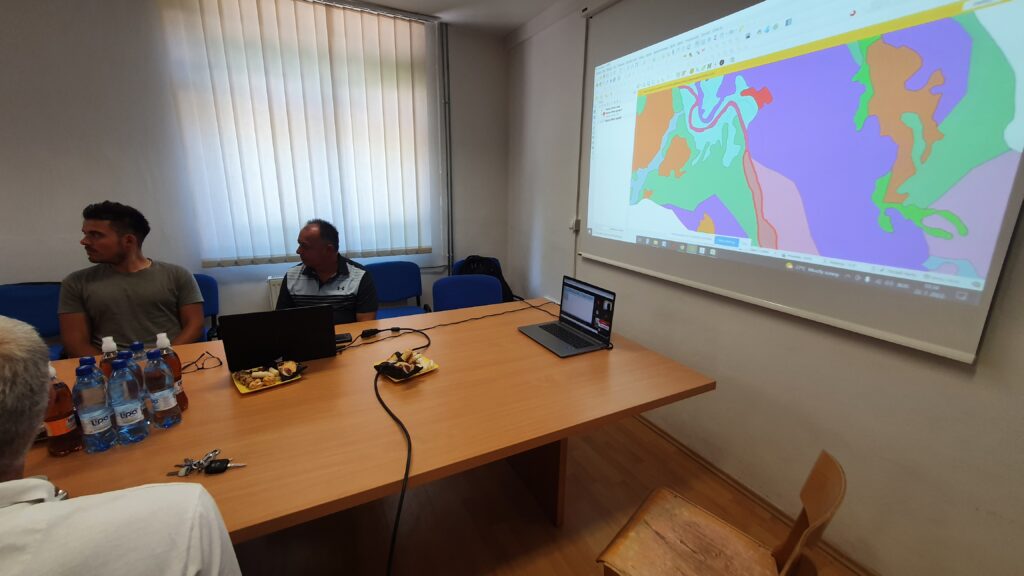
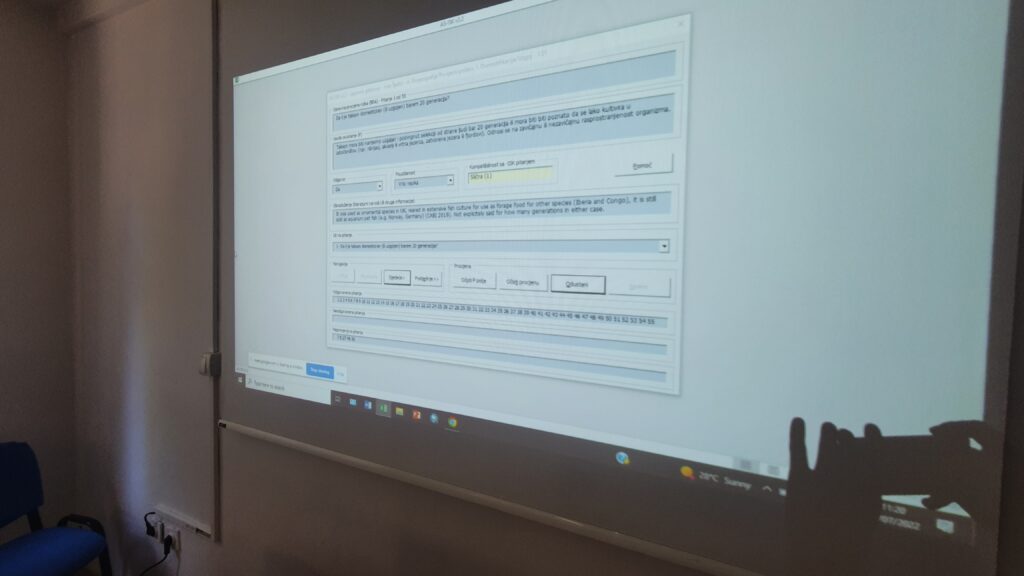
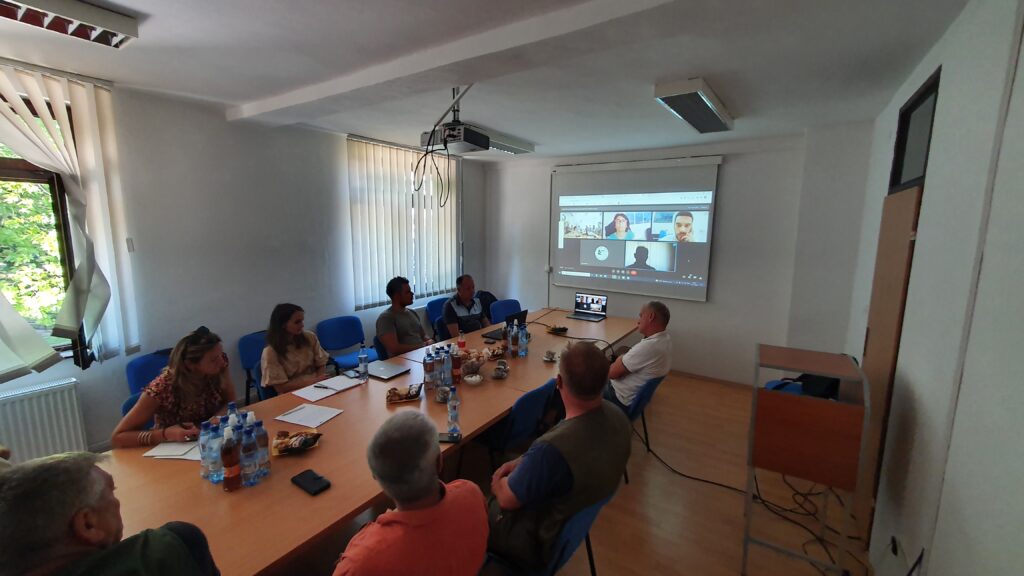
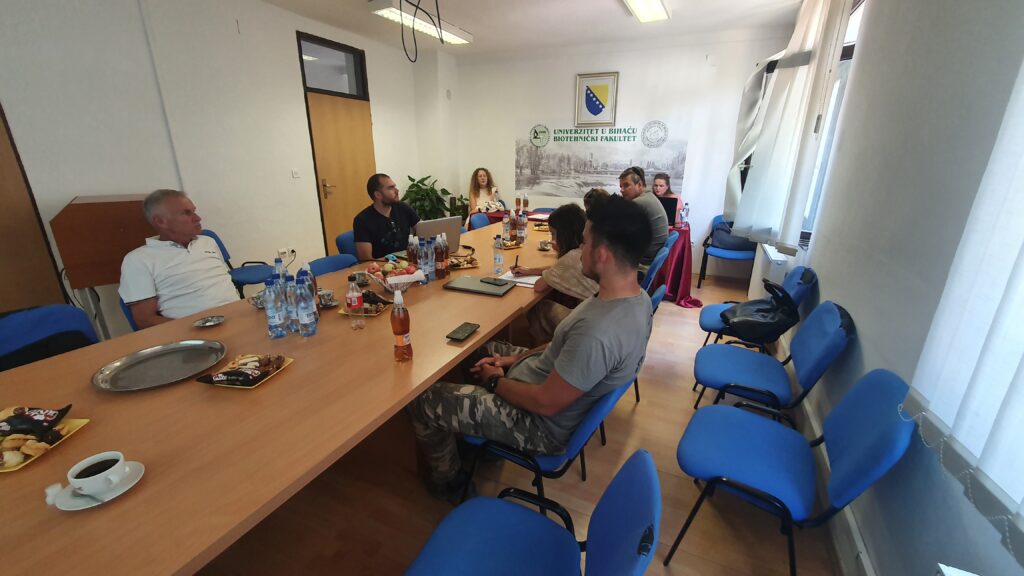
Video report on cantonal television USK – BIOTEHNICAL FACULTY ORGANIZED TRAINING ON THE PROTECTION OF INDIGENOUS FISH SPECIES OF THE UNE RIVER (Dissemination of the Erasmus+ RiskMan project)
_________________________
Visit of prof. Marina Piria,PhD to University of Bihać
Posted on June 14, 2022
As part of working and promotional activities in the scope of the Erasmus + CBHE project RiskMan, Marina Piria, full professor at the Faculty of Agriculture, University of Zagreb, paid a one-day visit to the University of Bihać. As a part of this visit, during a reception by the Rector of the University, prof. dr. Fadil Islamović, participants in the project from our University: prof. dr. Azra Bakrač, prof. dr. Emir Mujić and senior ass. Subha Avdić together with Professor Pirie, reported on the results achieved so far in the project, and also on the planned activities in the coming period. Further, in the scope of the Seventh International Scientific Conference “June 5th – World Environment Day”, organized by the Biotechnical Faculty of the University of Bihać, prof. dr. Marina Piria held a plenary lecture entitled ANALYSIS OF LEGISLATION ON THE MANAGEMENT OF THE INTRODUCTION AND SPREAD OF INVASIVE ALIEN SPECIES IN THE WESTERN BALKANS. During the presentation of the paper, prof. dr. Piria presented the achieved, processed and published results of the RiskMan project related to the assessment of regulation, educational practice and socio-economic perception of allochthonous aquatic species in the Balkan.
Posjeta prof. dr. Marine Pirie Univerzitetu u Bihaću
U sklopu radnih i promotivnih aktivnosti Erasmus+ CBHE projekta RiskMan prof. dr. Marina Piria, redovni profesor Agronomskog fakulteta, Sveučilišta u Zagrebu boravila je u jednodnevnoj posjeti Univerzitetu u Bihaću. U okviru ove posjete u prostorijama Rektorata, Univerziteta u Bihaću upriličen je prijem kod rektora Univerziteta prof. dr. Fadila Islamovića, kojeg su učesnici projekta ispred našeg Univerziteta prof. dr. Azra Bakrač, prof. dr. Emir Mujić i viši ass. Subha Avdić zajedno s profesoricom Piriom izvjestili o dosad postignutim rezultatima projekta, te o planiranim aktivnostima u narednom periodu. Pored ovih aktivnosti prof. dr. Marina Piria je u sklopu Seventh International Scientific Conference „June 5th – World Environment Day“, organized by the Biotechnical Faculty of the University of Bihać održala plenarno predavanja pod nazivom ANALYSIS OF LEGISLATION ON THE MANAGEMENT OF THE INTRODUCTION AND SPREAD OF INVASIVE ALIEN SPECIES IN THE WESTERN BALKANS. Tokom izlaganja ovog rada prof. dr. Marina je prezentirala postignute, obrađene i publikovane rezultate RiskMan projekta koji se odnose na procjenu regulacije, obrazovne prakse i socio-ekonomske percepcije alohtonih vodenih vrsta na području Balkana.
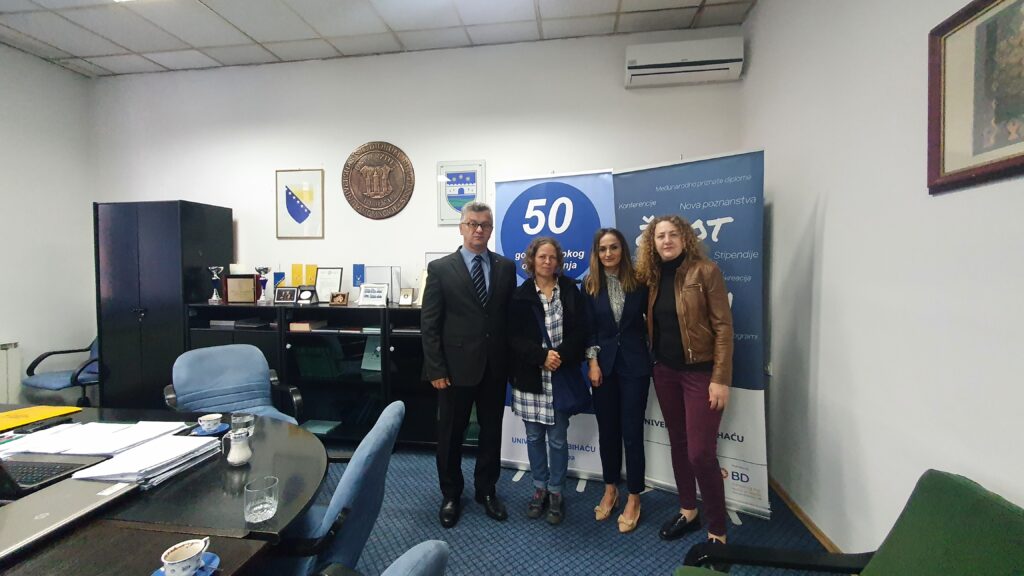
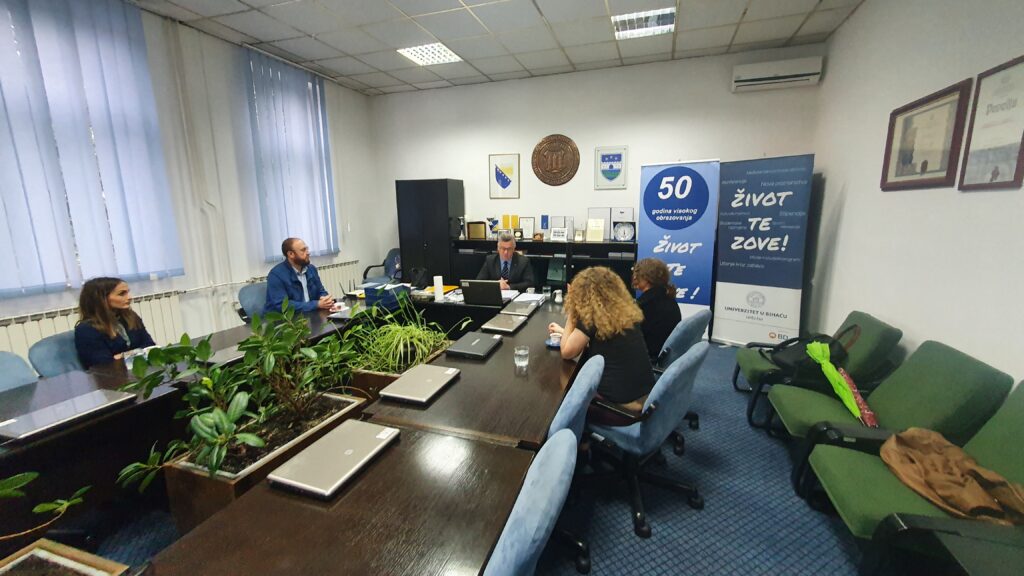
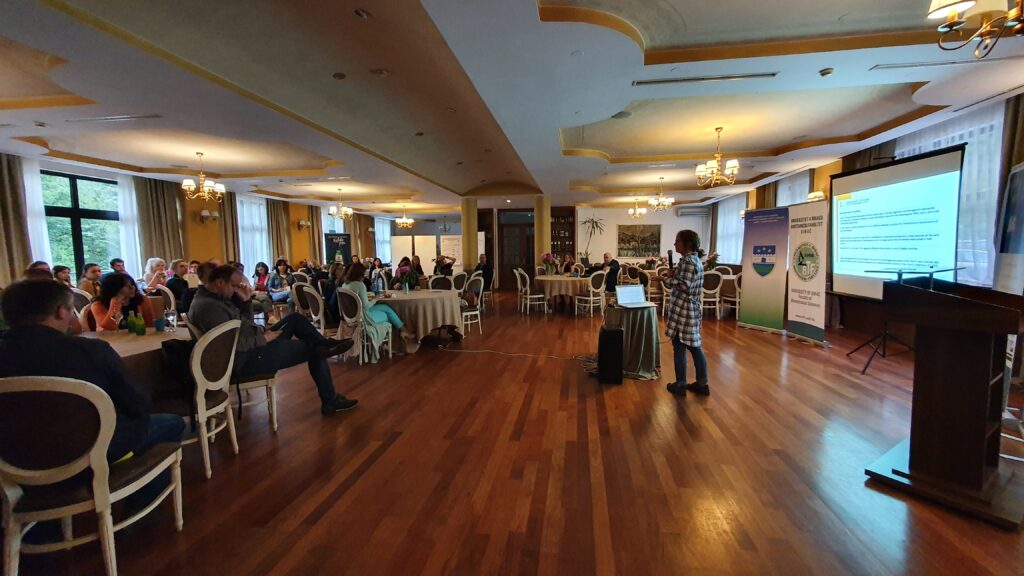
_________________________
RiskMan Steering Committee Meeting – Kotor, Montenegro
Published on June 21st, 2022
The RiskMan Steering Committee Meeting was hled in Kotor
The RiskMan Steering Committee Meeting was held in Kotor, Montenegro in the period from June 13 to 18, 2022. During the meeting, the participants discussed and decided on activities related to the currently open work packages WP4, WP5 and WP7. Within these WPs, tasks such as Analysis of pilot test results, Finalization of new courses and the beginning of the implementation process, Training activities in partner countries, Preparation of final reports for customized courses, and Creation of a policy framework for the creation of a new profession “RiskManger” were discussed. Also, it is important to note that the members of the RiskMan project with their scientific papers participated at the International Conference Adriatic Biodiversity Protection – AdriBioPro2022
Sastanak upravnog odbora Erasmus+CBHE RiskMan projekta održan je u Kotoru, Crna Gora u periodu od 13. do 18. juna 2022. Tokom sastanka učesnici su raspravljali i odlučivali o aktivnostima vezanim za trenutno otvorene radne pakete WP4, WP5 i WP7. U okviru ovih WP-a razgovaralo se o zadacima kao što su analiza rezultata pilot testiranja, finalizacija novih kurseva i početak procesa raalizacije, aktivnosti obuke u partnerskim zemljama, izrada završnih izvještaja za prilagođene kurseve, izrada okvira politike za kreiranje novog zanimanja “RiskManger”. Također, važno je napomenuti da su članovi projekta RiskMan sa svojim radovima učestvovali na International Conference Adriatic Biodiversity Protection – AdriBioPro2022
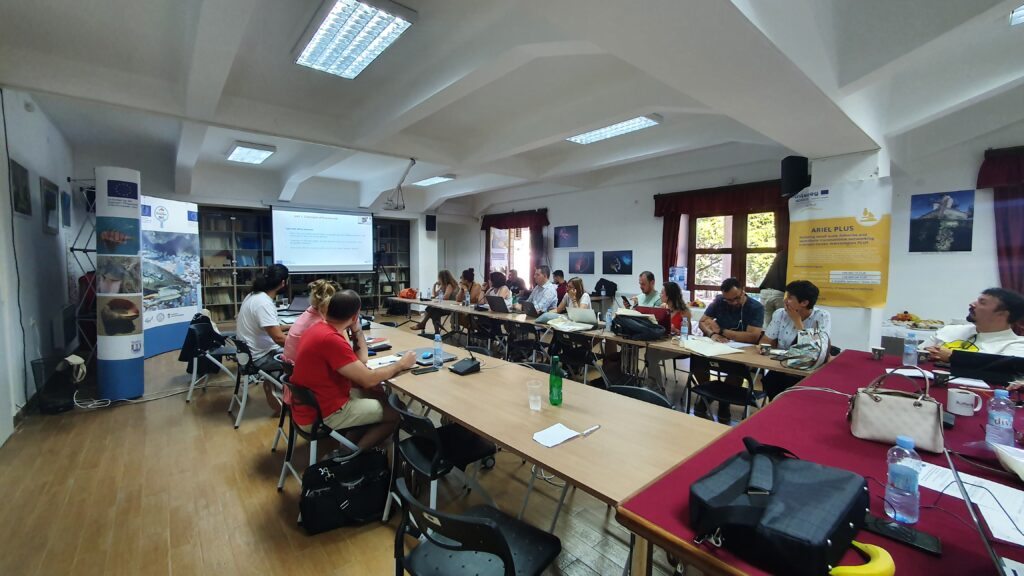
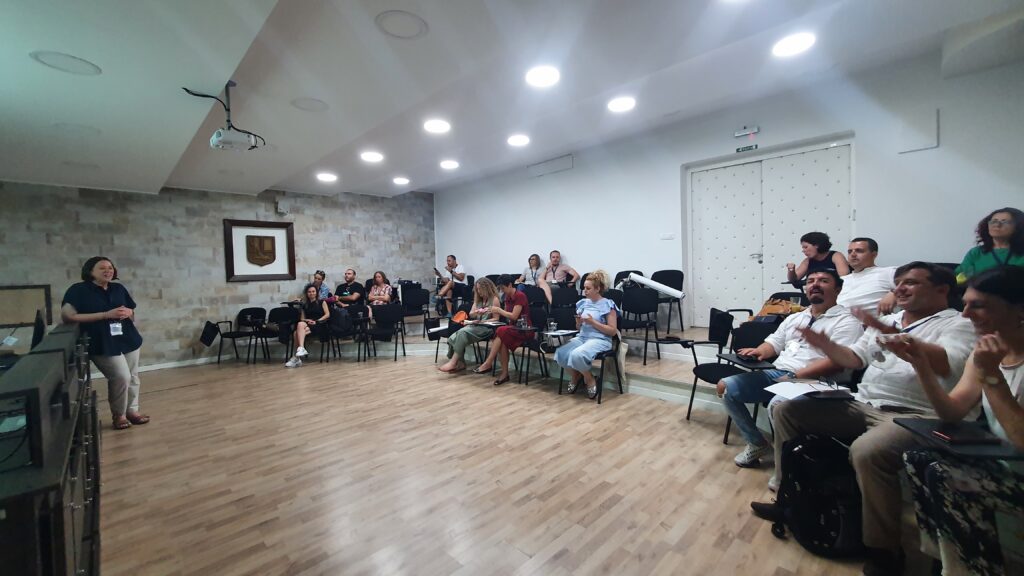
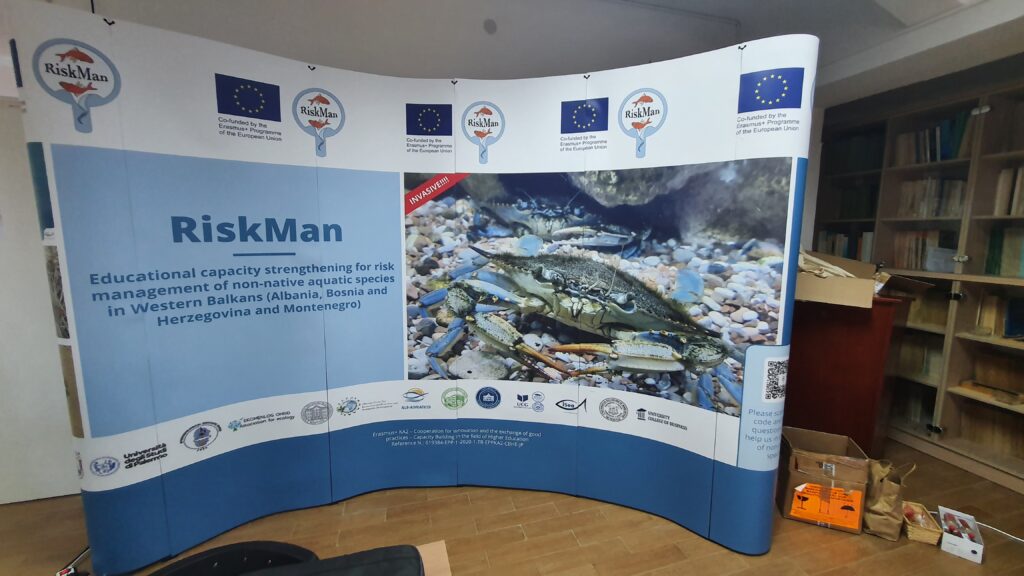
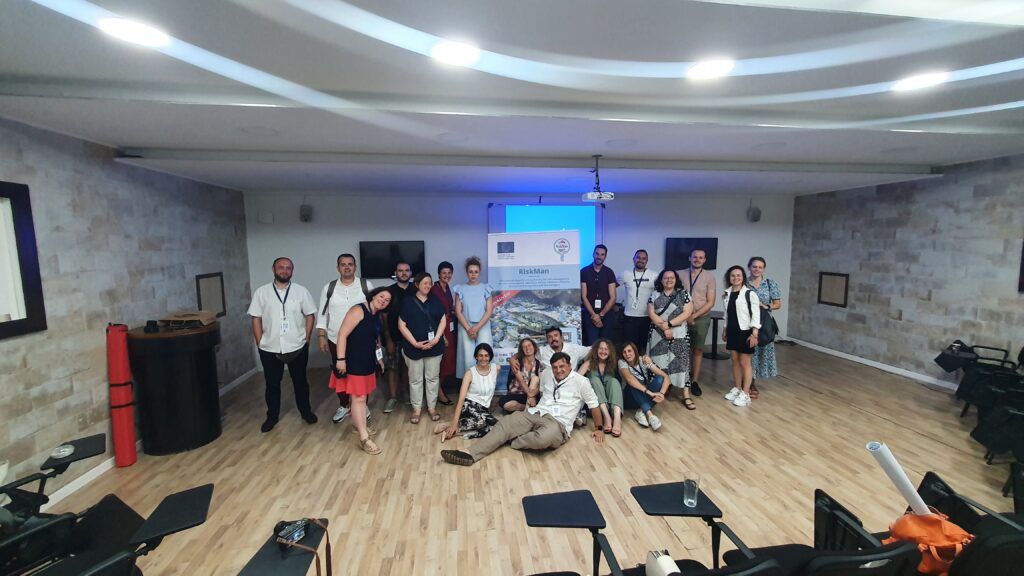
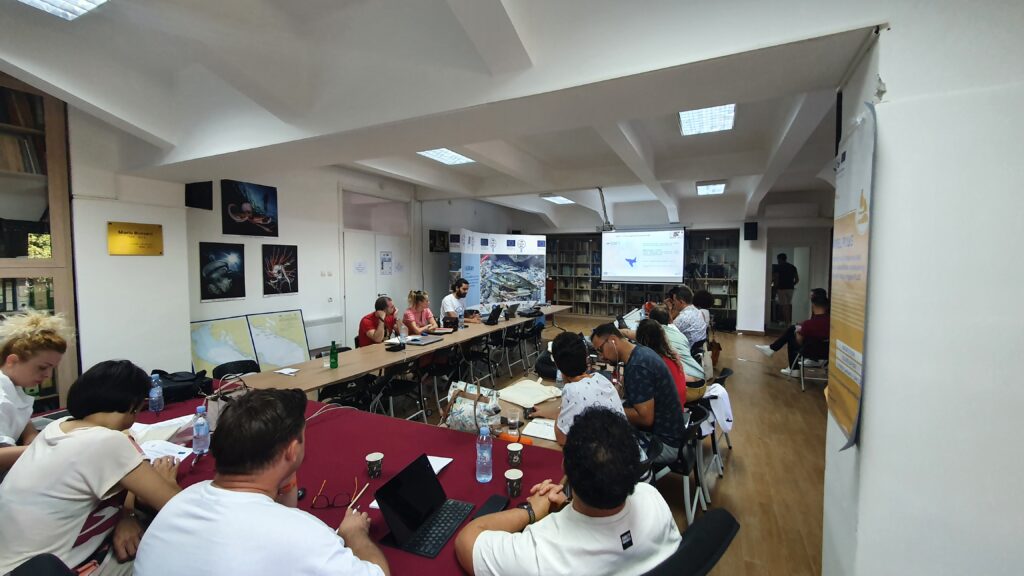
_________________________
Promotion of the Erasmus+ RiskMan project during the “Una river Day” event
Published on May 31st, 2022
As part of the celebration of the “Una river Day” on 20th of May, 2022 prof. Azra Bakrač and MA Subha Avdić presented a project “Erasmus+ “Educational Capacity Strengthening for Risk Management of Non-native Aquatic Species in the Western Balkans (Albania, Bosnia and Herzegovina and Montenegro)” – RiskMan“.
The presentation was attended by representatives of local authorities, fishermen's associations and local population.
After the presentation of the WP’s that are made so far within the project, a very useful discussion took place among present guests.
Representatives of fishermen's associations pointed out the huge problems regarding certain invasive species in rivers in the USK area, while representatives of local authorities had the opportunity to hear about the issue of invasive species for the first time.
As part of the discussion, certain measures were also proposed in order to raise the awareness of the local community and the authorities regarding invasive species, which the representatives of the Biotechnical Faculty will try to implement in the coming period.
U sklopu obilježavanja dana rijeke Une (17 maj), dana 20.05.2022. godine dr.sc. Azra Bakrač i MA Subha Avdić prezentirale su projekat pod nazivom „Erasmus+ project “Educational Capacity Strengthening for Risk Management of Non-native Aquatic Species in the Western Balkans (Albania, Bosnia and Herzegovina and Montenegro)” – RiskMan“.
Prezentaciji su prisustvovali predstavnici lokalne vlasti, udruženja ribara i lokalno stanovništvo. Nakon prezentiranja do sada urađenih paketa u sklopu projekta, uslijedila je vrlo korisna diskusija od strane prisutnih. Predstavnici ribarskih udruženja su istaknuli ogromne probleme po pitanju određenih invazivnih vrsta u rijekama na području USK, dok predstavnici lokalne vlasti su po prvi put imali priliku slušati o problematici invazivnih vrsta. U sklopu diskusije su također predložene određene mjere u cilju podizanja svijesti lokalnog stavništa i vlasti po pitanju inavazivnih vrsta, a koje će predstavnici Biotehničkog fakulteta u narednom periodu nastojati provesti.
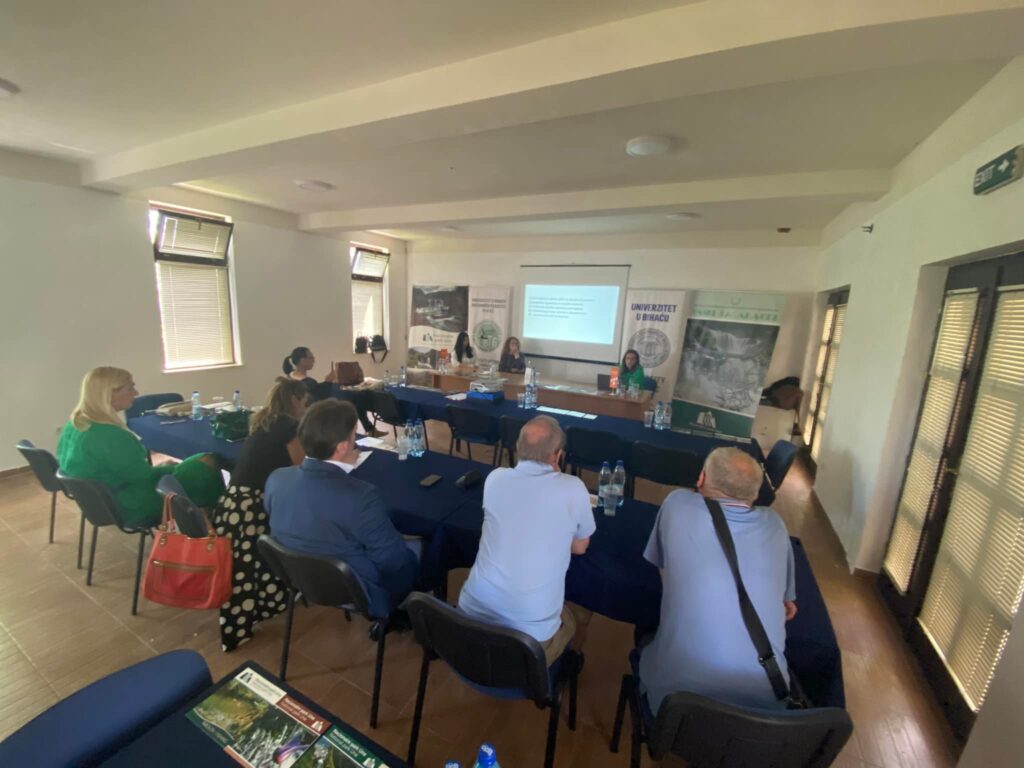
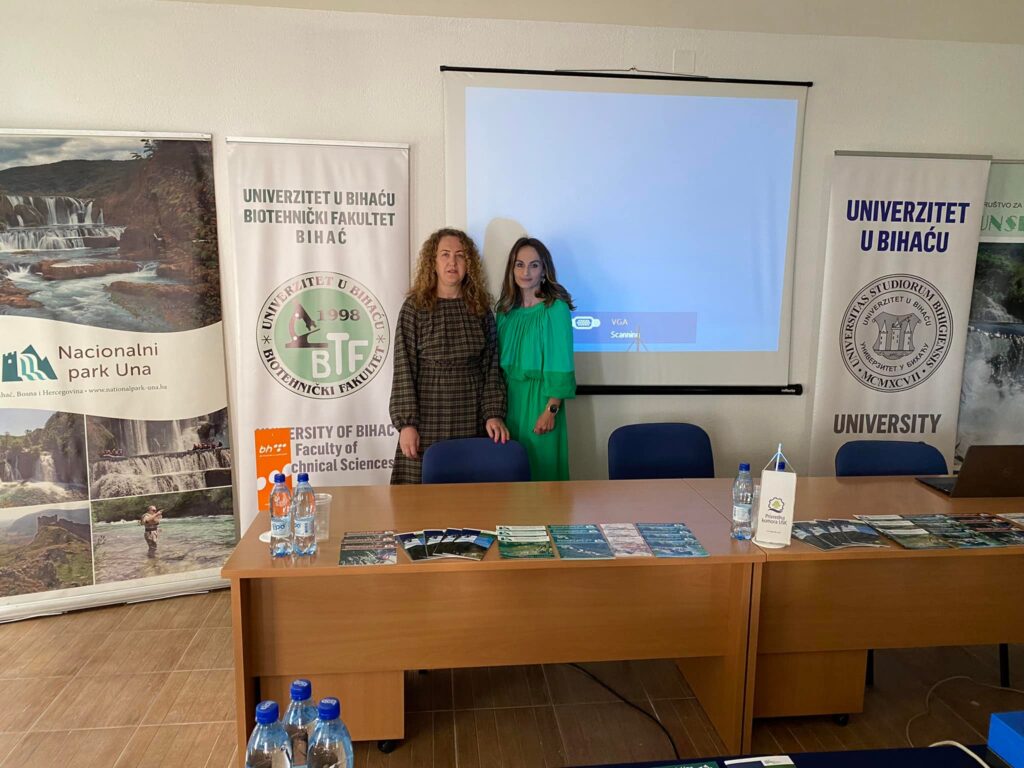
_________________________
Promotion of Erasmus + CBHE RiskMan on TV live
Published on April 1st, 2022
Promotion of “Erasmus+ project “Educational Capacity Strengthening for Risk Management of Non-native Aquatic Species in the Western Balkans (Albania, Bosnia and Herzegovina and Montenegro)” – RiskMan“ on cantonal television RTVUSK. Talk about the project and implemented activities. The project was presented by Prof. Azra Bakrač, MA Subha Džafić and UNBI student Maida Delić.
Promocija Erasmus+ project “Educational Capacity Strengthening for Risk Management of Non-native Aquatic Species in the Western Balkans (Albania, Bosnia and Herzegovina and Montenegro)” – RiskMan“ tokom gostovanja uživo u emisiji “Poslijepodne uz RTV USK.
___________________
Diplomski kandidata “Opće karakteristike invazivnih vrsta“
A final graduate BA thesis, entitled “General characteristics of invasive species”
Published on April 1st, 2022
Dana 01.04. 2022 godine, na Biotehničkom fakultetu Univerziteta u Bihaću, odbranjen je diplomski/završni rad kandidata Nejre Halkić, pod naslovom ”Opće karakteristike invazivnih vrsta”, sa ocjenom A/izvrstan (10). Mentor na ovom radu je redovna profesorica Azra Bakrač koja je ujedno član tima Erasmus+ projekta “Jačanje obrazovnih kapaciteta za upravljanje rizikom od alohtonih (ne-nativni) vodenih vrsta u zemljama Zapadnog Balkana (Albanija, Bosna i Hercegovina i Crna Gora)” RiskMan. Ideja za ovaj završni rad je rezultat navedenog projekta, pri čemu je upravo učinjen prvi korak o podizanju svijesti o negativnom efektu invazivnih vrsta, kao i njihovih općih karaktersitika.
A final graduate BA thesis, entitled “General characteristics of invasive species”, was exposed to the commision by a candidate Nejra Halkić and gaind maximum points/grade – excellent (10). This event took place on April 1, 2022 at Biotechnical Faculty of University of Bihać.
The mentor for this work is full professor Azra Bakrač, who is also a member of the Erasmus + project team „Erasmus+ project “Educational Capacity Strengthening for Risk Management of Non-native Aquatic Species in the Western Balkans (Albania, Bosnia and Herzegovina and Montenegro)” – RiskMan“.
The idea for the final graduate thesis was brought as the result of the project, by which the first step has just been taken to raise awareness about the negative effects of invasive species, as well as their general characteristics.
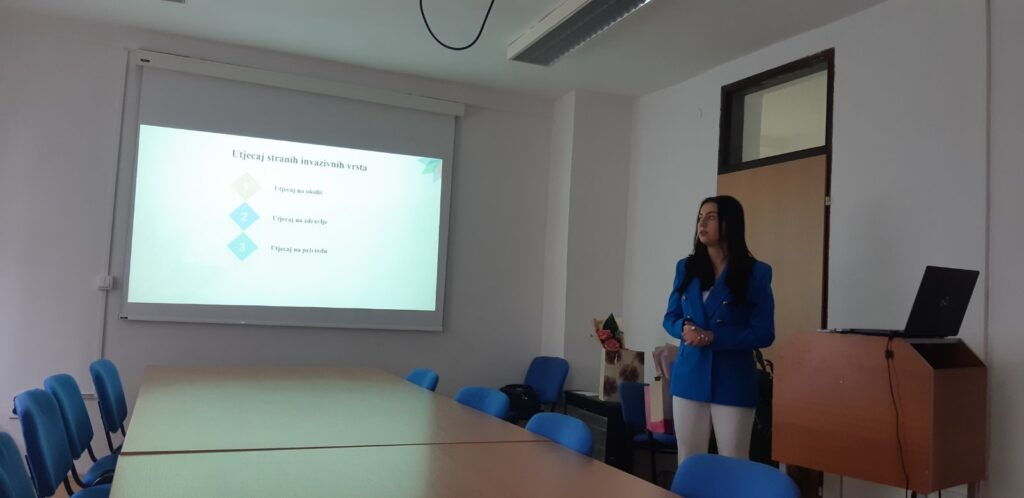
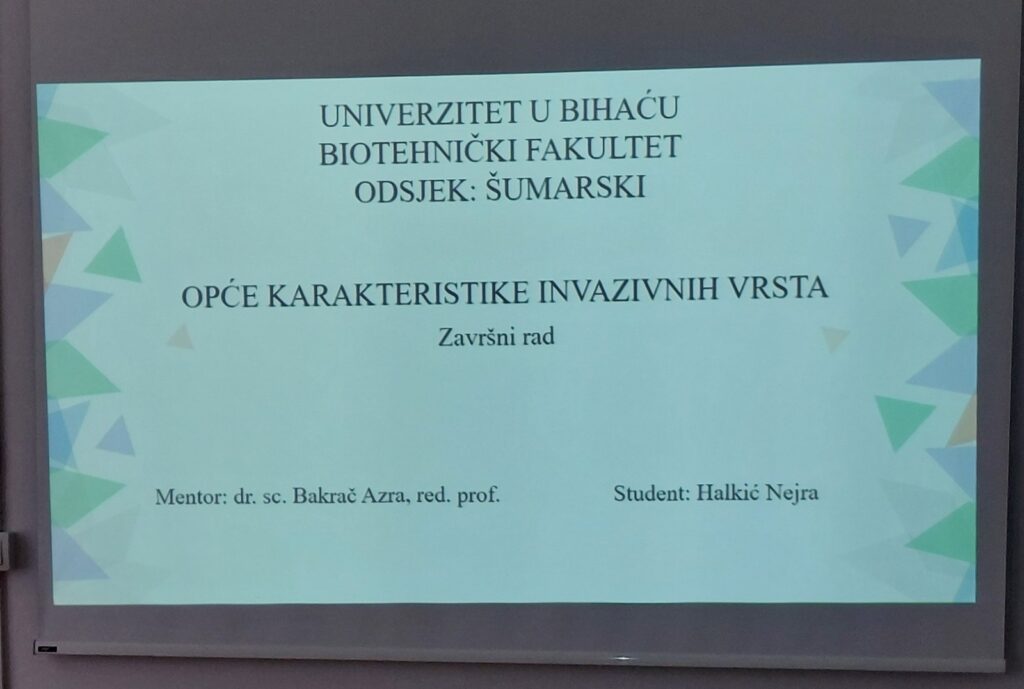
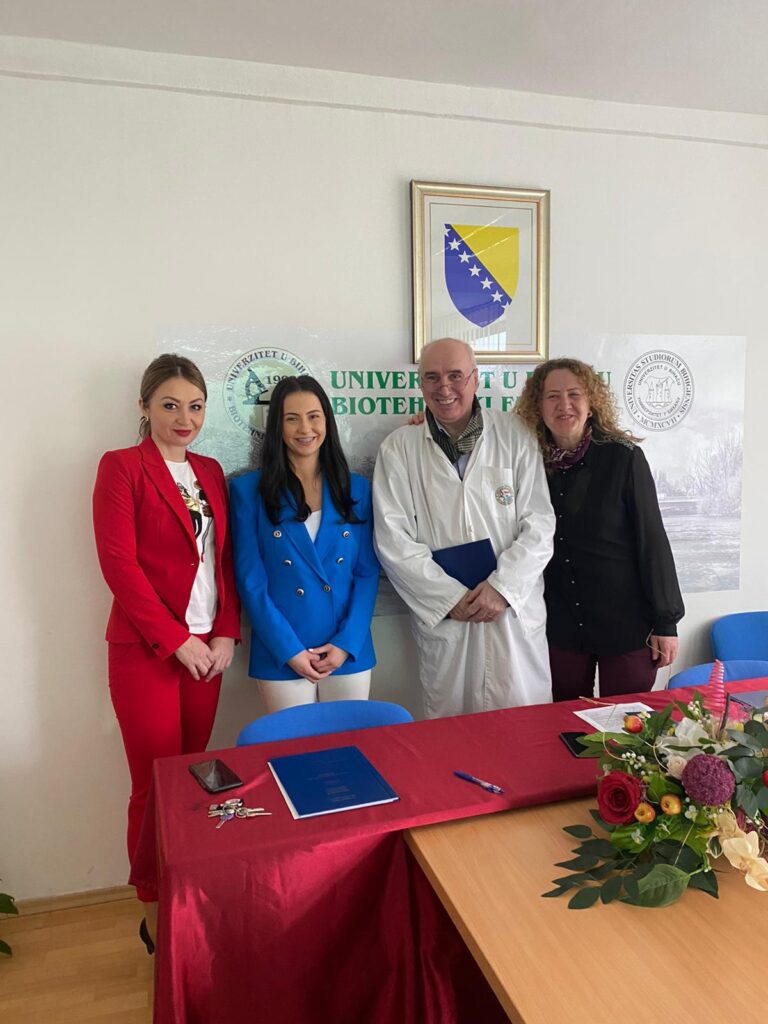
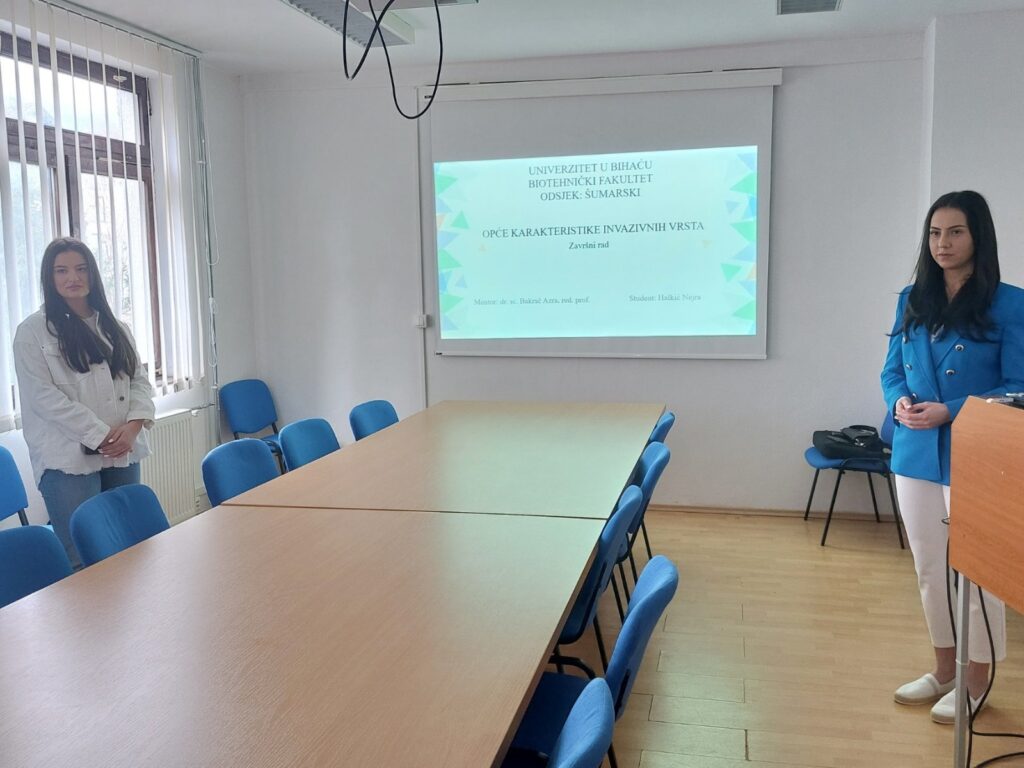
___________________
Sarajevo meeting “Curricula Pilot Testing Meeting with accompanying committee meetings” – March 14th – March 18th 2022, Faculty of Science University of Sarajevo
Published: March 15th, 2022
Faculty of Science University of Sarajevo was a host for a hybrid event “Curricula Pilot Testing Meeting with accompanying committee meetings” of Erasmus+ RiskMan project. The event took a place between 14 th and 18 th of March, 2022. First day of the meeting was aimed at holding roundtables, meeting among project menagement team, presentation of reports and activcities among WP2, WP3 and WP4, and planning future activities under WP5, as well. In the following meeting days, Curricula Pilot Testing in the field of Biology and impact of non-native aquatic species were main topic.
Erasmus+ RiskMan “Curricula Pilot Testing Meeting with accompanying committee meetings” u hibridnom obliku održan je u Sarajevu u periodu od 14. do 18. marta 2022. godine. Organizator sastanka je bio Faculty of Science University of Sarajevo. Tokom prvog dana sastanka održani su okrugli stolovi sa stakeholderima, sastanak menadžment tima projekta, prezentacija izvještaja i aktivnosti unutar WP2, WP3 i WP4, te planiranje budućih aktivnosti u sklopu WP5. U preostalim danima sastanka provedena su pilot testiranja kurikuluma iz oblasti biologije i impakta ne-nativni vodenih vrsta
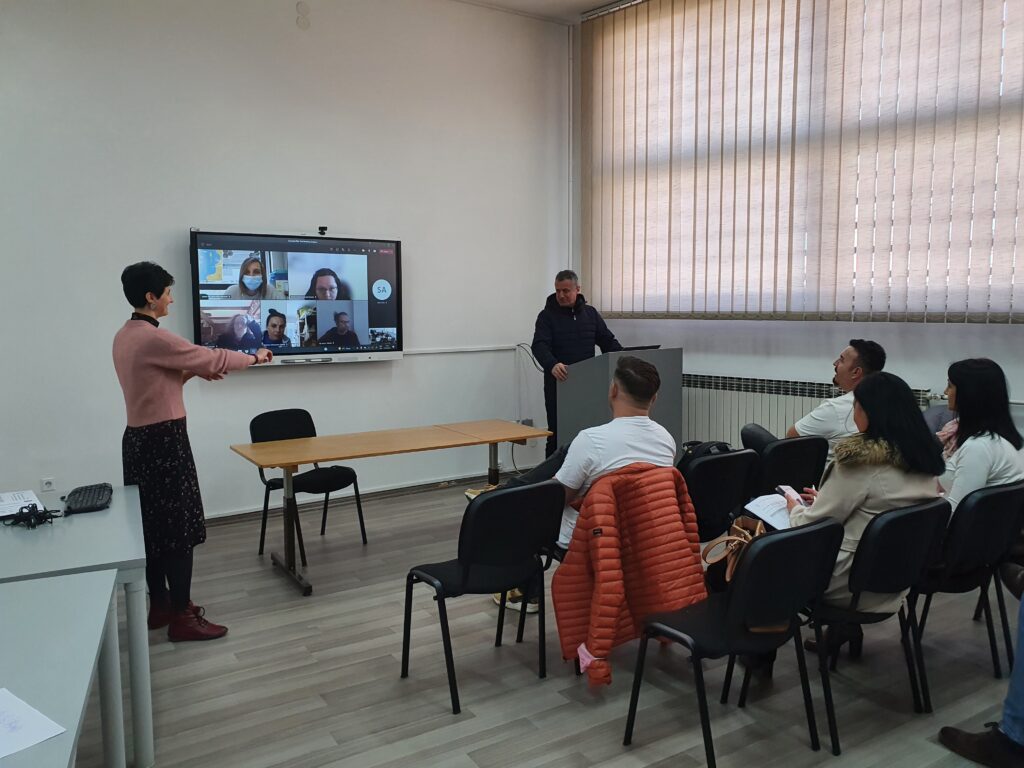
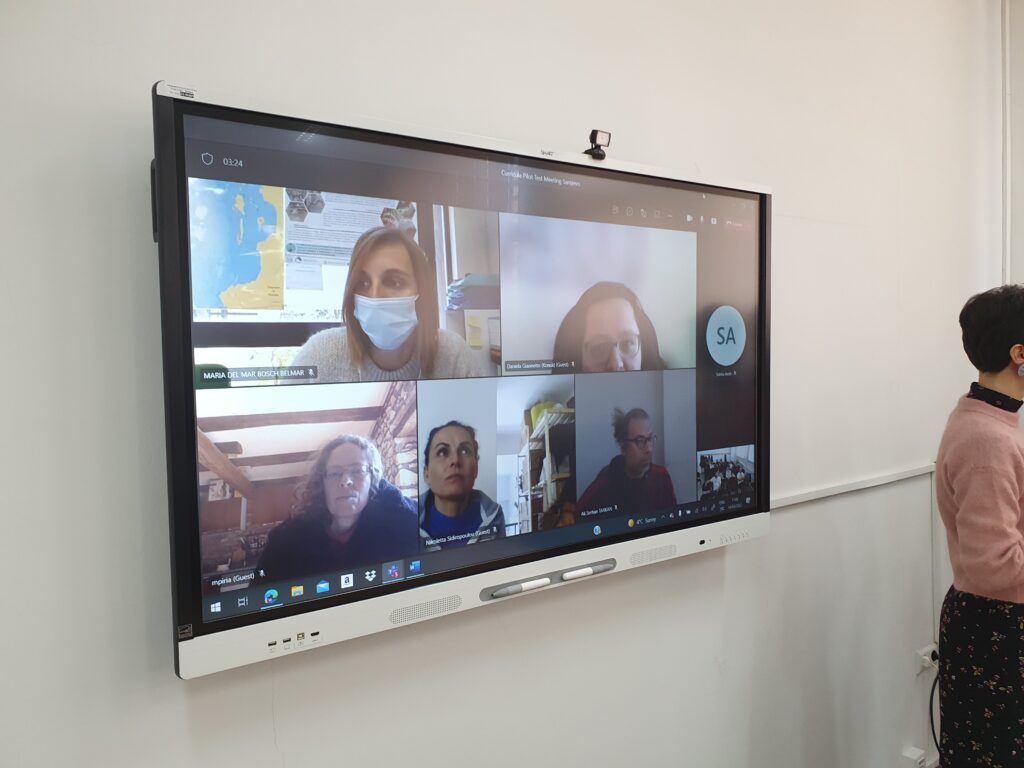
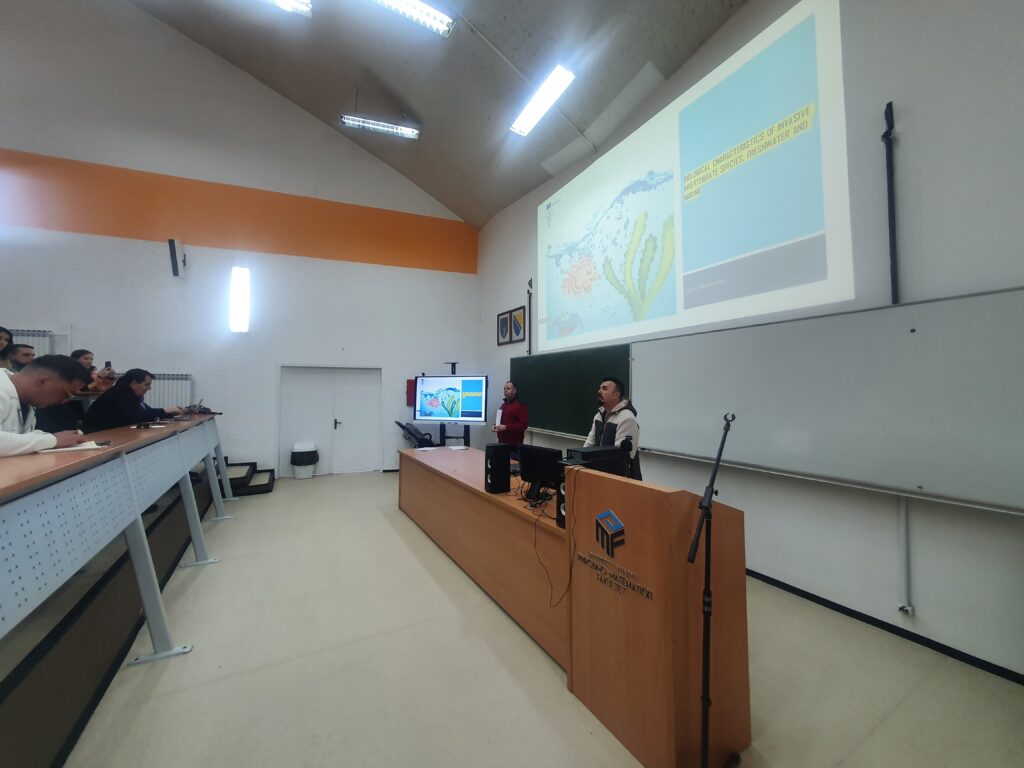
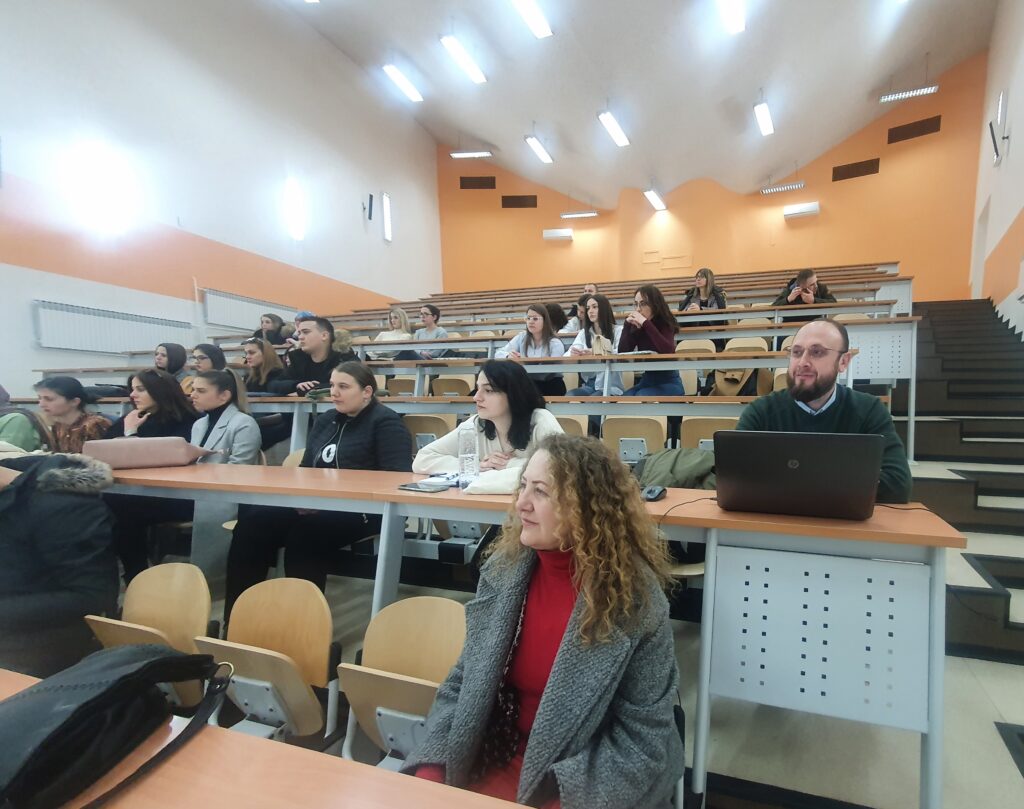
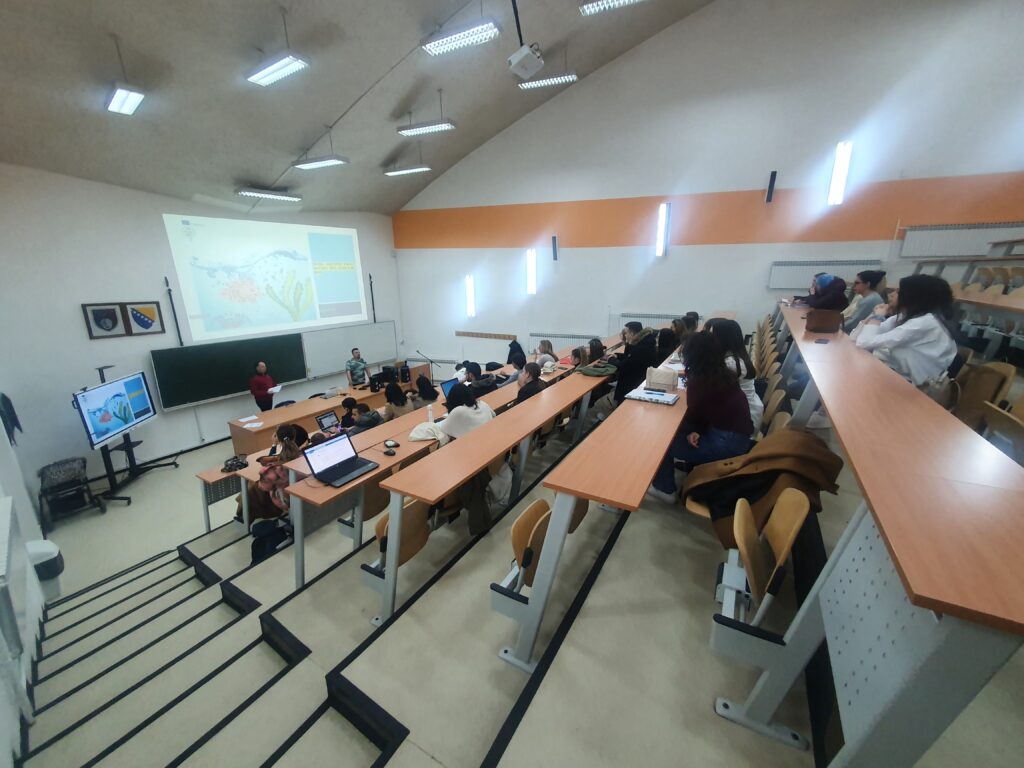
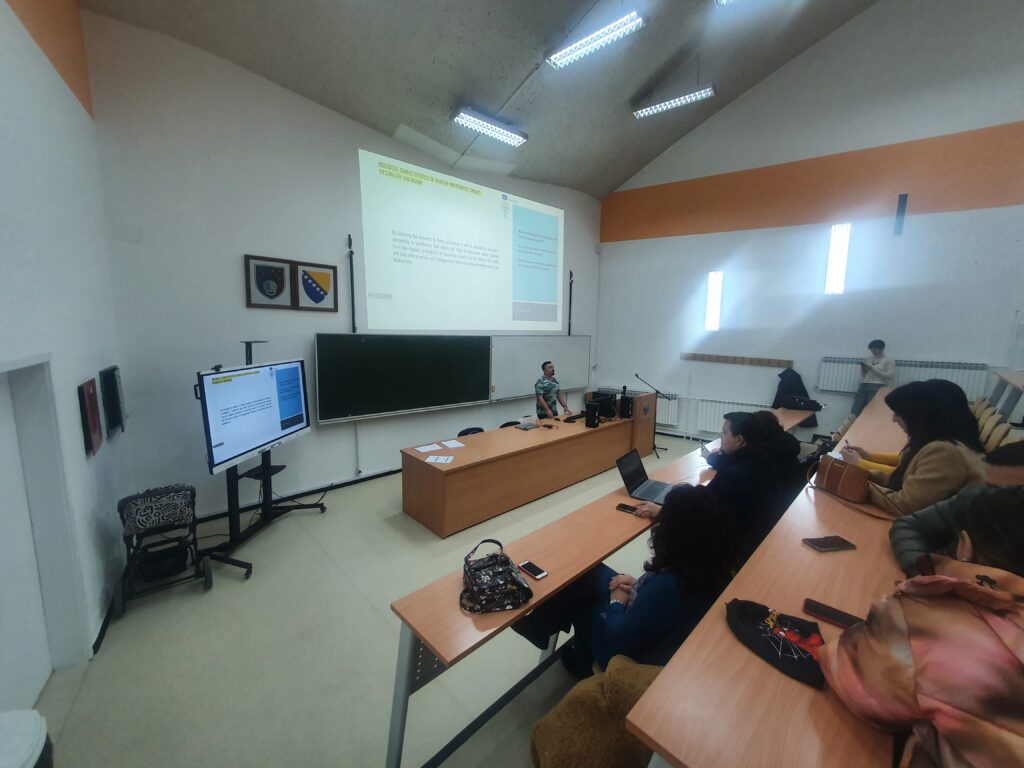
__________________________
Published: Decembar 30, 2021
Promotion of Erasmus+ CBHE RiskMan Project during the PROMOTION OF PROJECT ACTIVITIES OF THE UNIVERSITY OF BIHAĆ
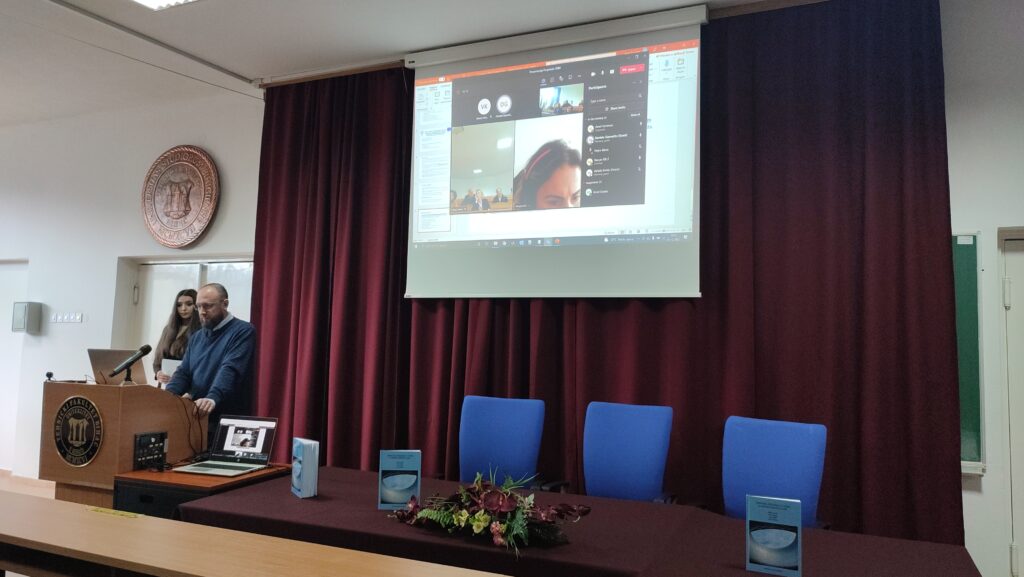
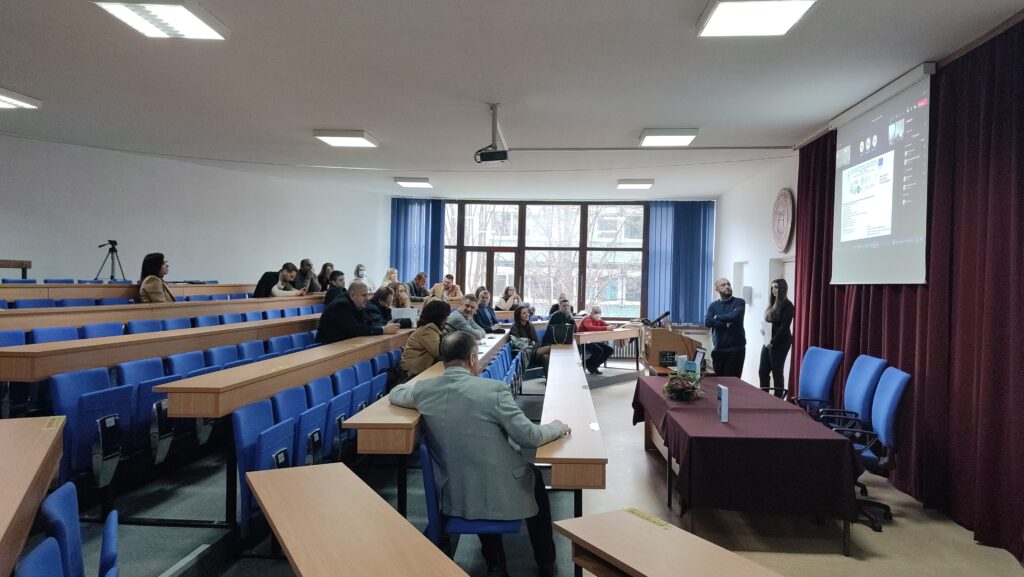
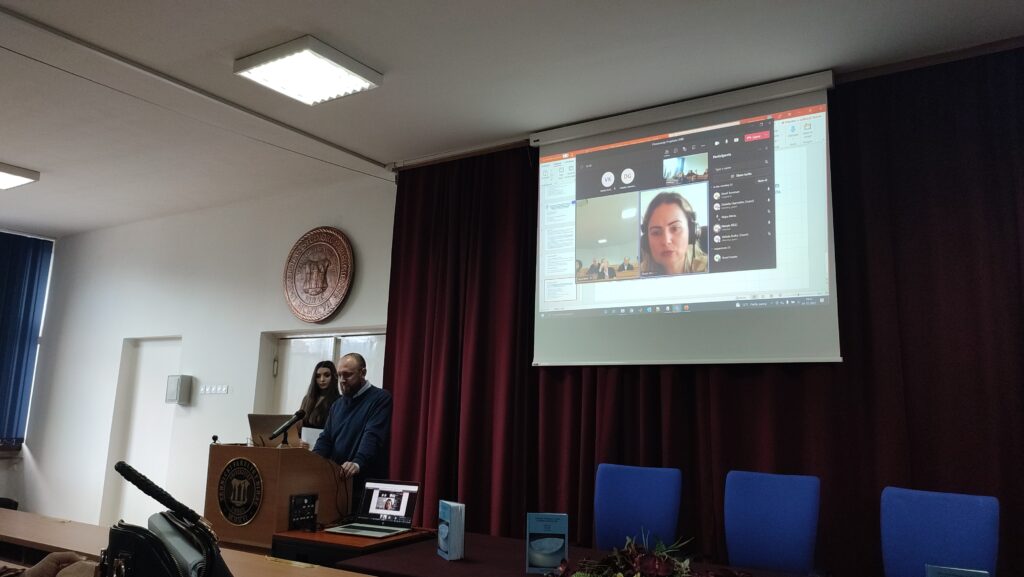
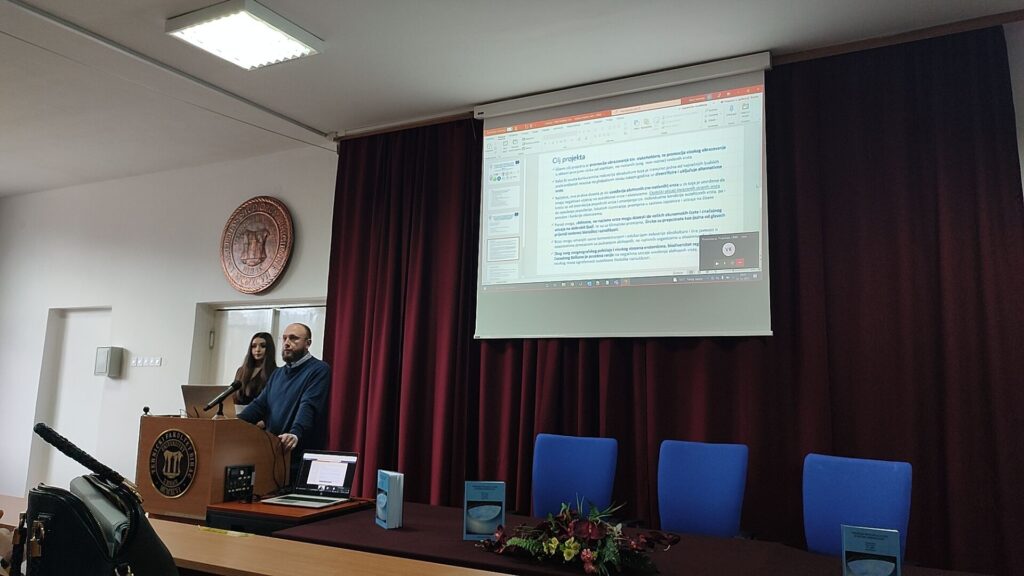
__________________
Published: Decembar 22, 2021
Promotion of Project Activities of The University of Bihać
Announcement of the Promotion of Erasmus+ CBHE RiskMan Project
________________
Published: Decembar 9, 2021
Online meeting between Coordinator of the RiskMan project , BiH project participants (UNSA and UNBI) and EACEA
An online meeting between the Erasmus+ CBHE coordinator of the RiskMan project (Muğla Sıtkı Koçman University – Turkey), BiH project participants (UNSA and UNBI) and EACEA representatives Anne GELLI and Luigi SAIA was held on Thursday, December 9, 2021. Equipment procurement process for needs of RiskMan project was discissed at the meeting as a joint procurement among partner institutions at national level, UNSA and UNBI.
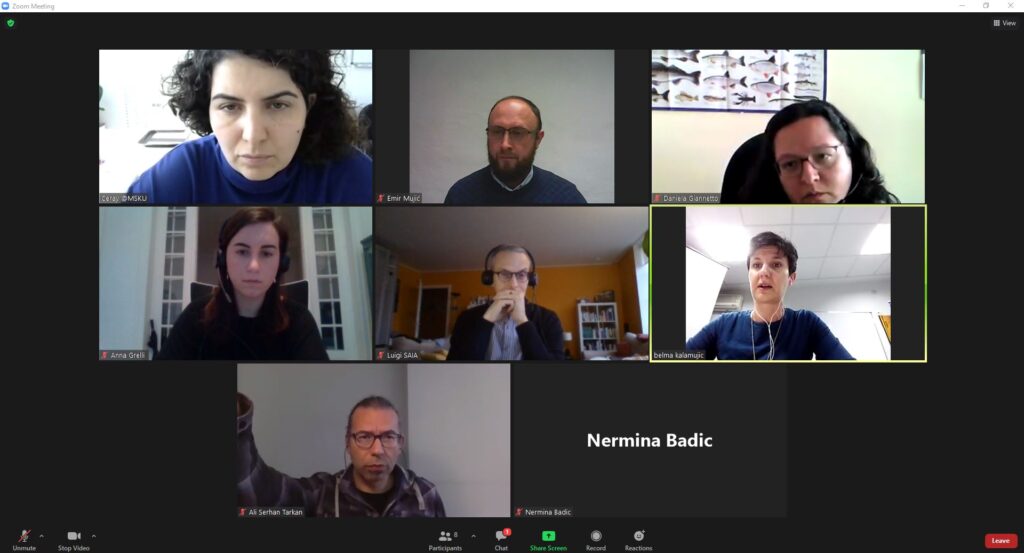
____________
Published: Decembar 8, 2021
BiH National RiskMan Online Meeting
Online – Zoom meeting between UNSA and UNBI was held on Tuesday, Decembar 7, 2021. During the meeting, BiH partners discussed abouth possibility of joint procurement of equipment through the Erasmus+ CBHE project RiskMan.
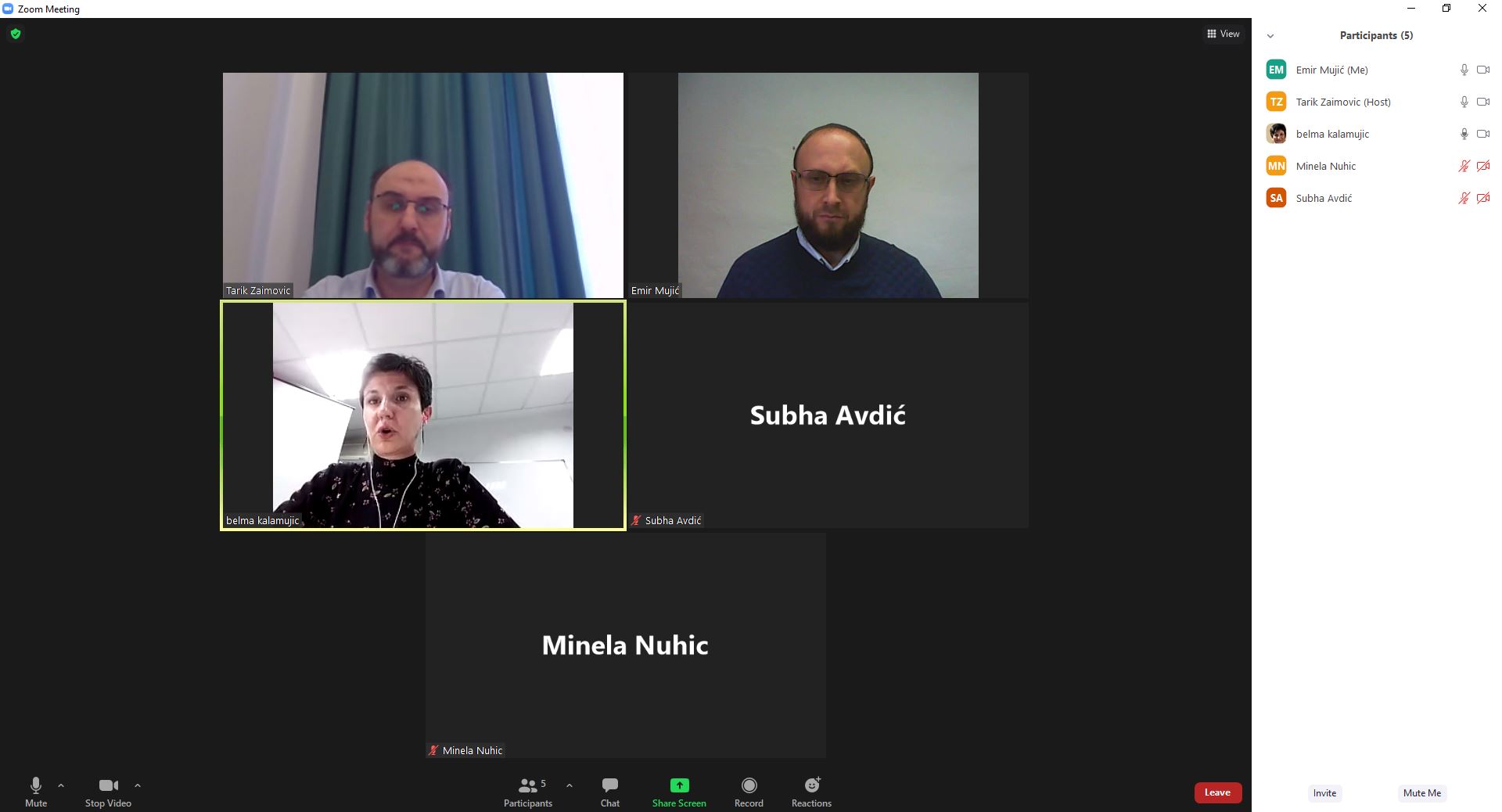
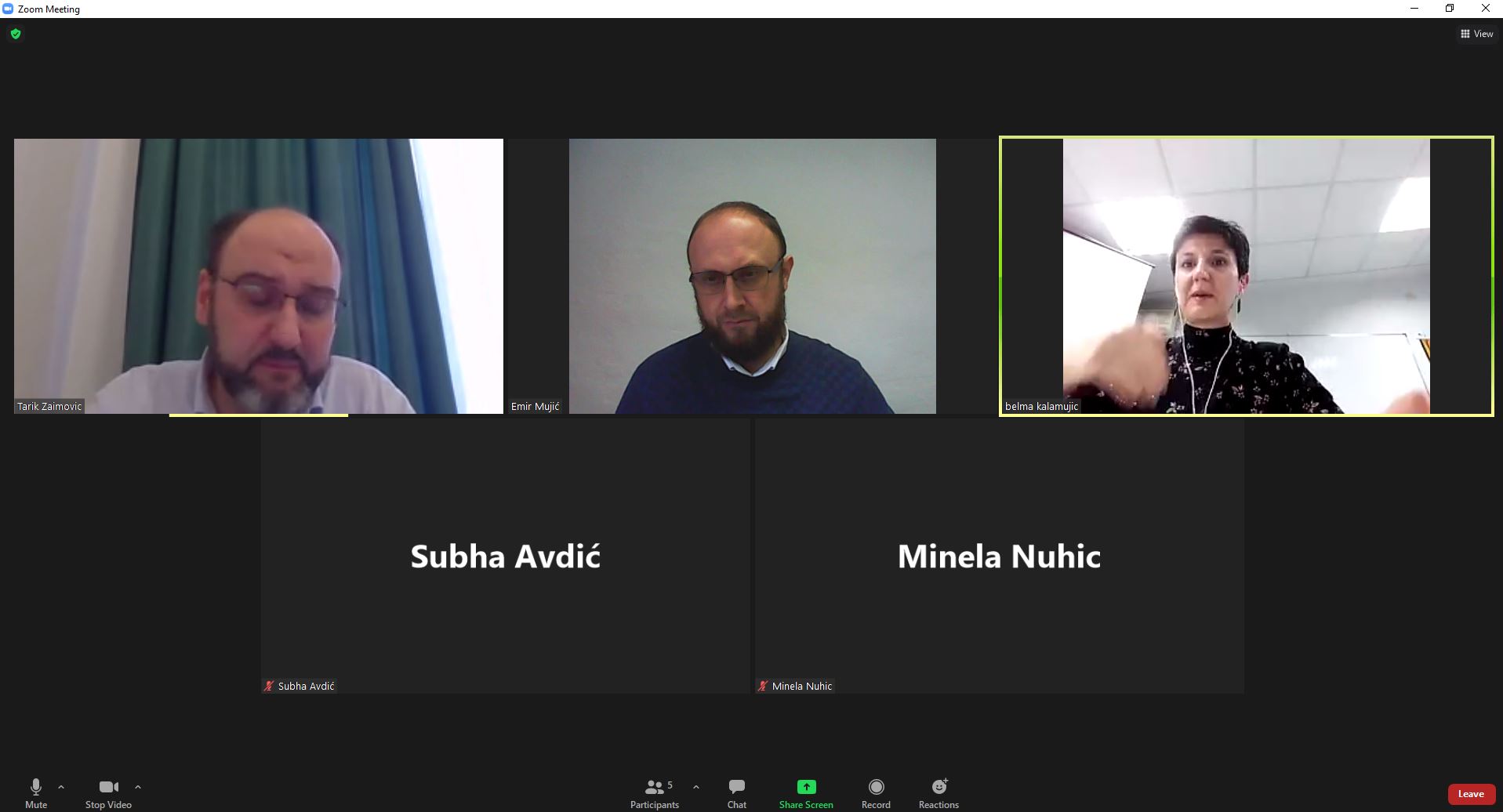
____________
Published 20 November 2021
Steering Committee RiskMan Meeting
Educational Capacity Strengthening for Risk Management of Non-native Aquatic Species in Western Balkans (Albania, Bosnia and Herzegovina and Montenegro)
November 10th Wednesday to 14th Sunday 2021
Muğla, Turkey
Muğla Sıtkı Koçman University , Kötekli Campus
On behalf of the University of Bihac and the UNBI RiskMan team Prof. Asoc. Azra Bakrač participated in the Steering Committee RiskMan Meeting held from November 10th Wednesday to 14th Sunday 2021 in City Muğla, Turkey, at the Muğla Sıtkı Koçman University, Kötekli Campus.
the meeting was focused on:
- Status overview of the RiskMan project and progress the work of the project
- Identification and addressing issues and risks
- Providing relevant information on communication and visibility criteria
- Maintenance open lines of communication and foster team building
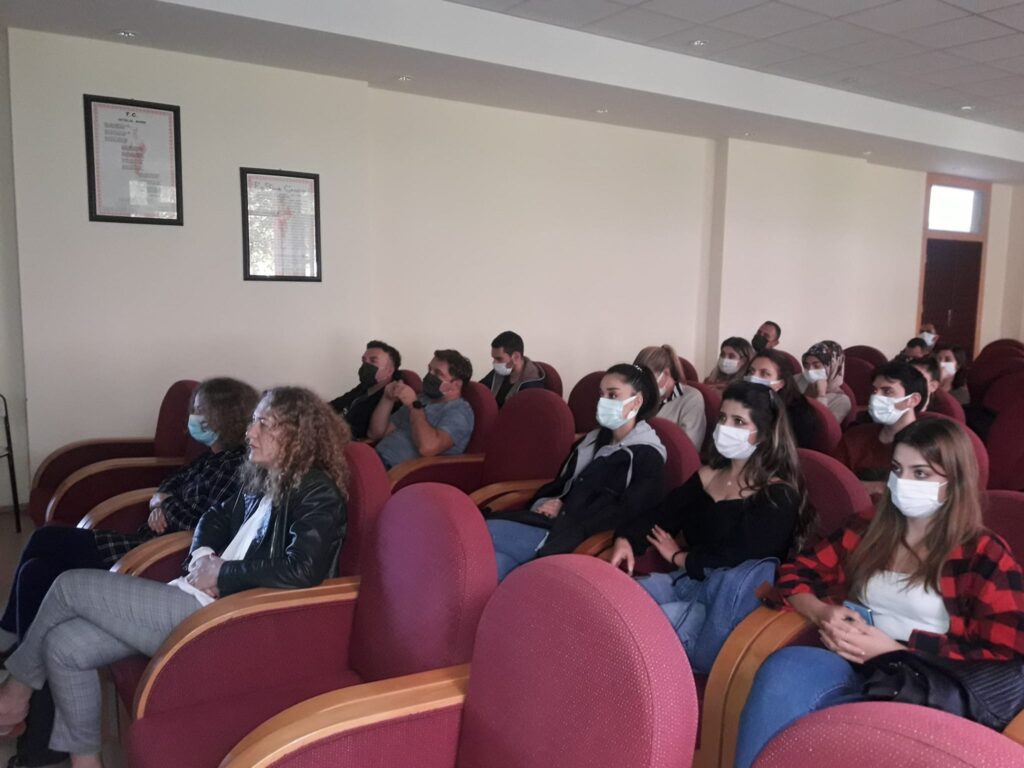
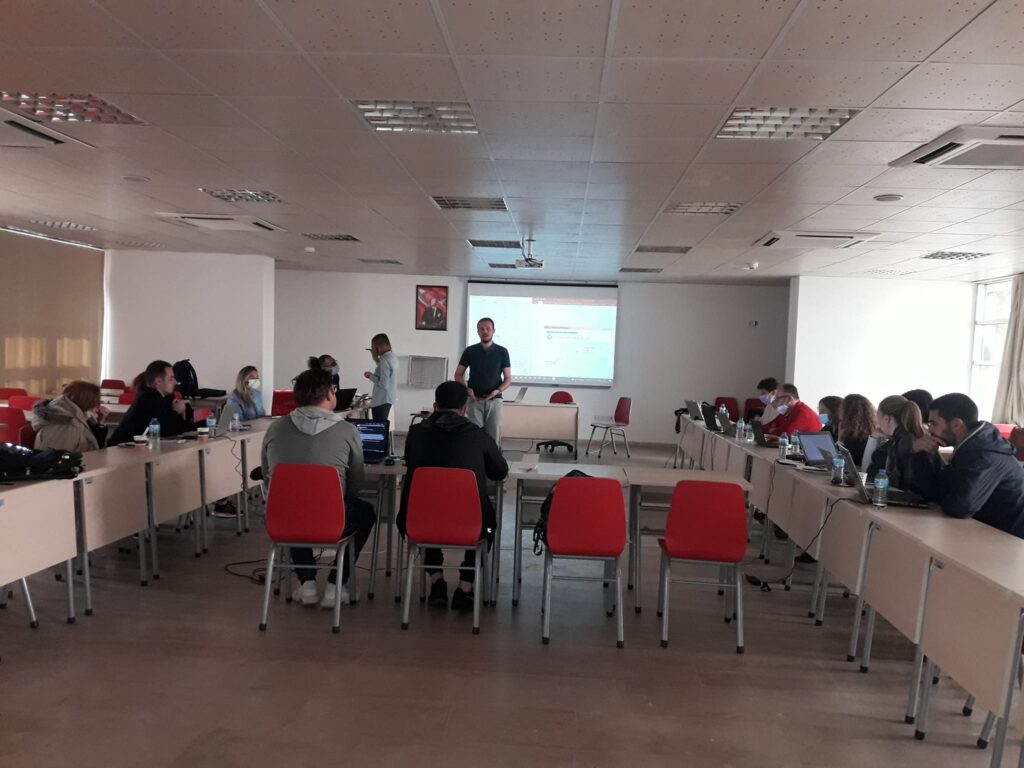
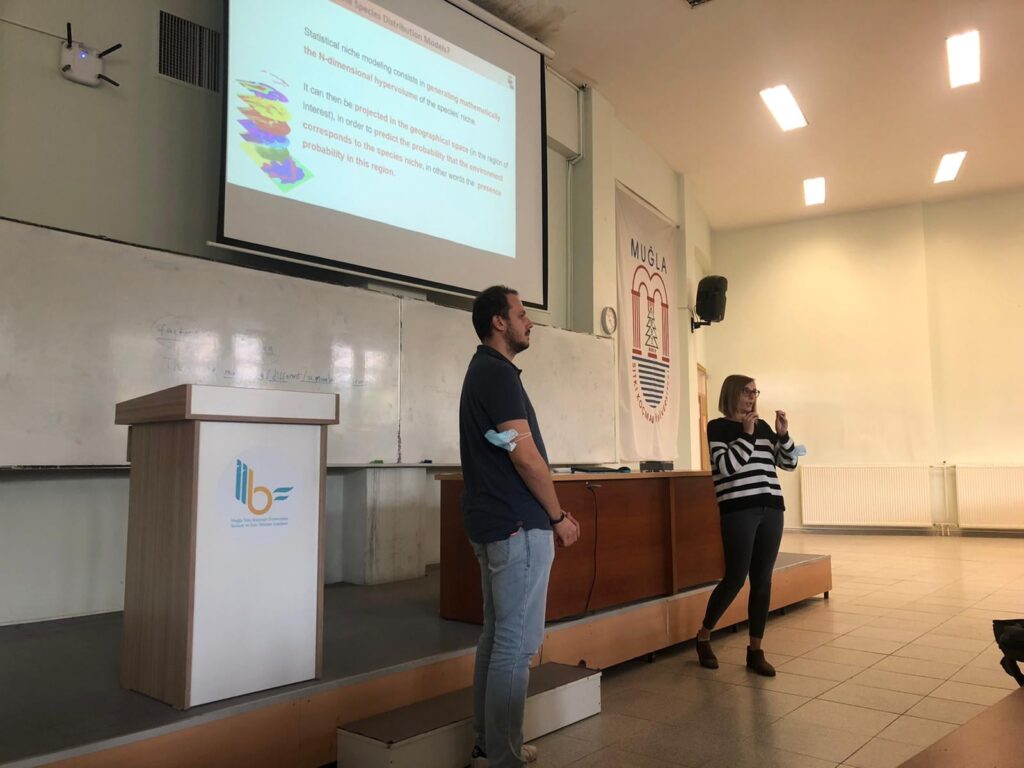
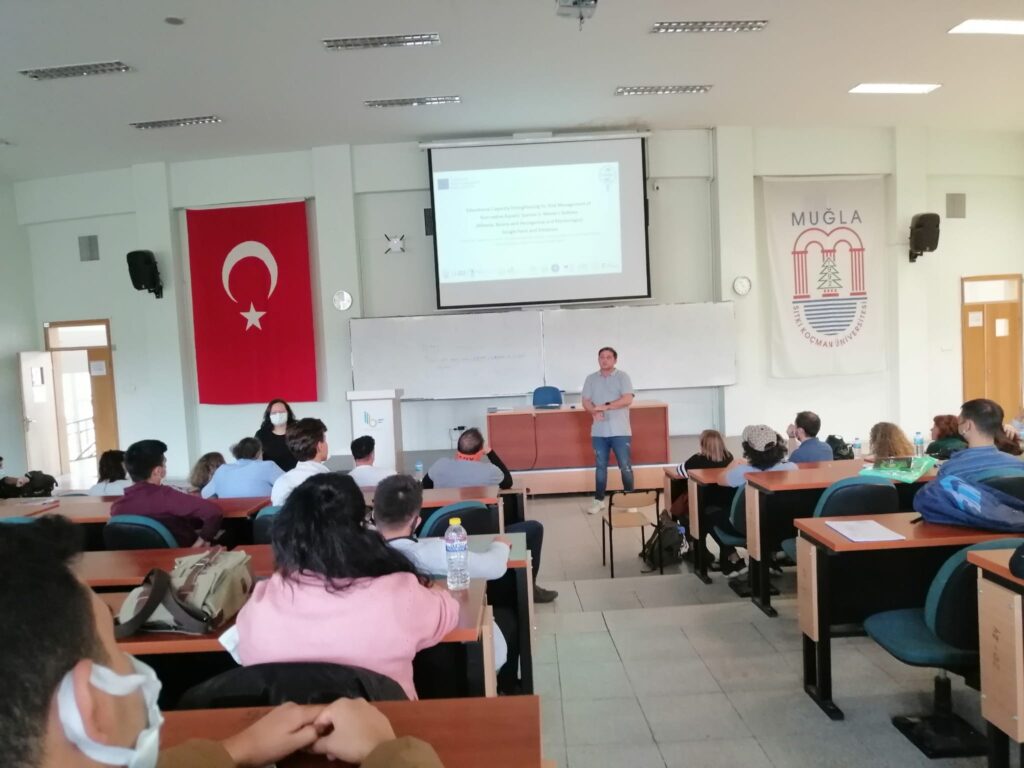
____________
Twitter post
_____________________
BiH National RiskMan Meeting
Published 01 October 2021
As part of the Erasmus+ RiskMan project, a national (BIH) meeting between UNSA and UNBI was held on September 30 at the Faculty of Science University of Sarajevo. The possibility of joint procurement of equipment through the RIskMan project was discussed at the meeting. The meeting was attended by Asst Prof. Emir Mujić on behalf UNBI and Prof.dr. Nusret Drešković, and Prof. dr. Samir Đug on behalt UNSA.
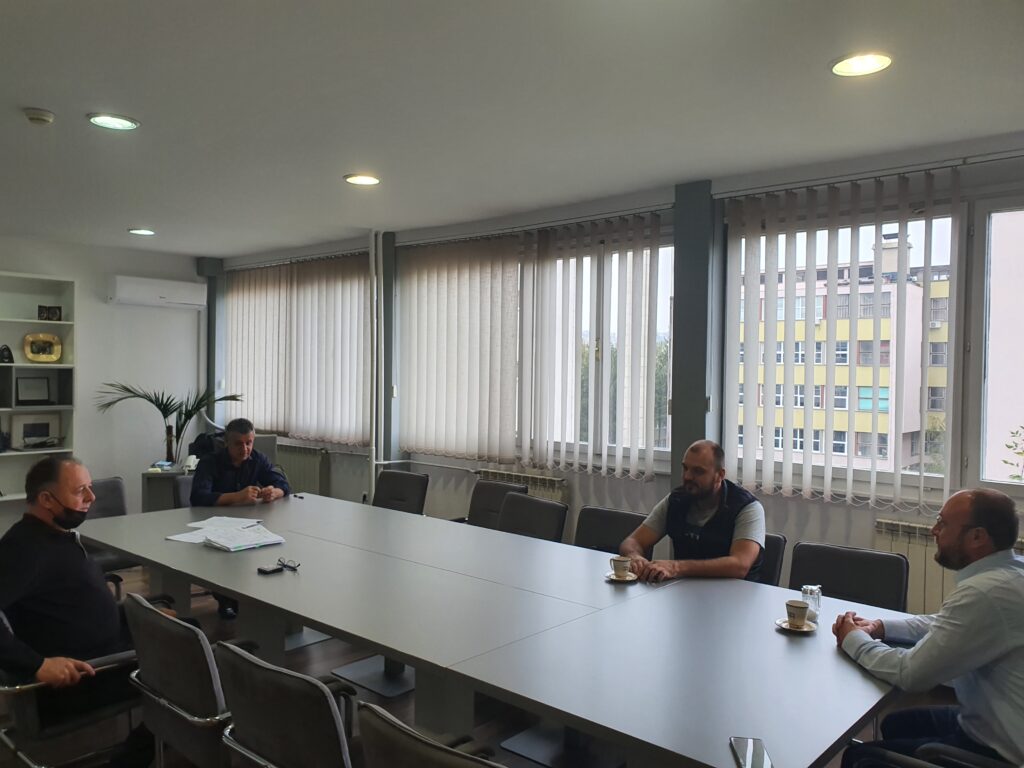
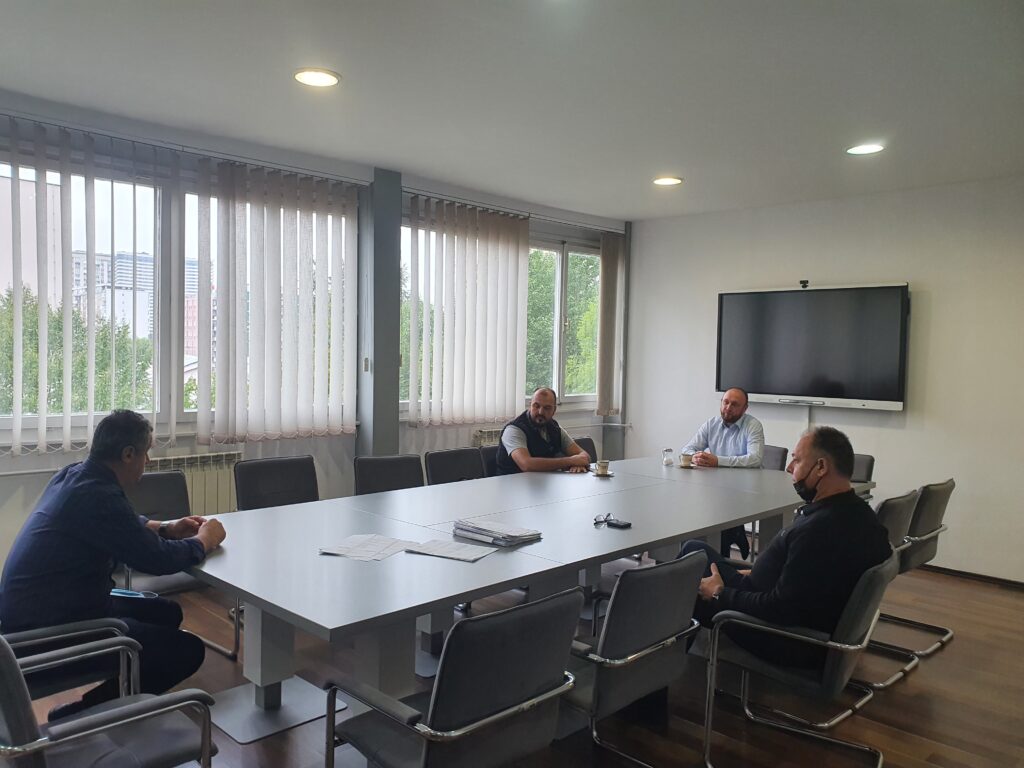
____________
Training on Risk Assessment Tools – Part 1: ASK-ISK
Published 31 August 2021
The UNBI RiskMan team participated in the online Training on Risk Assessment Tools Part 1: ASK-ISK. The training was held by professors from the University of Zagreb Marina Piria and Ivan Špelić, and prof. Ali Serhan Tarkan from Muğla Sıtkı Koçman University.
UNBI RiskMan-a učestvovao je u online radionici pod nazivom Training on Risk Assessment Tools Part 1: ASK-ISK. Edukaciju o praktičnoj upotrebi softvera ASK-ISK održali su profesori sa Univerziteta u Zagrebu Marina Piria i Ivan Špelić, te prof. Ali Serhan Tarkan sa Univerziteta Muğla Sıtkı Koçman.
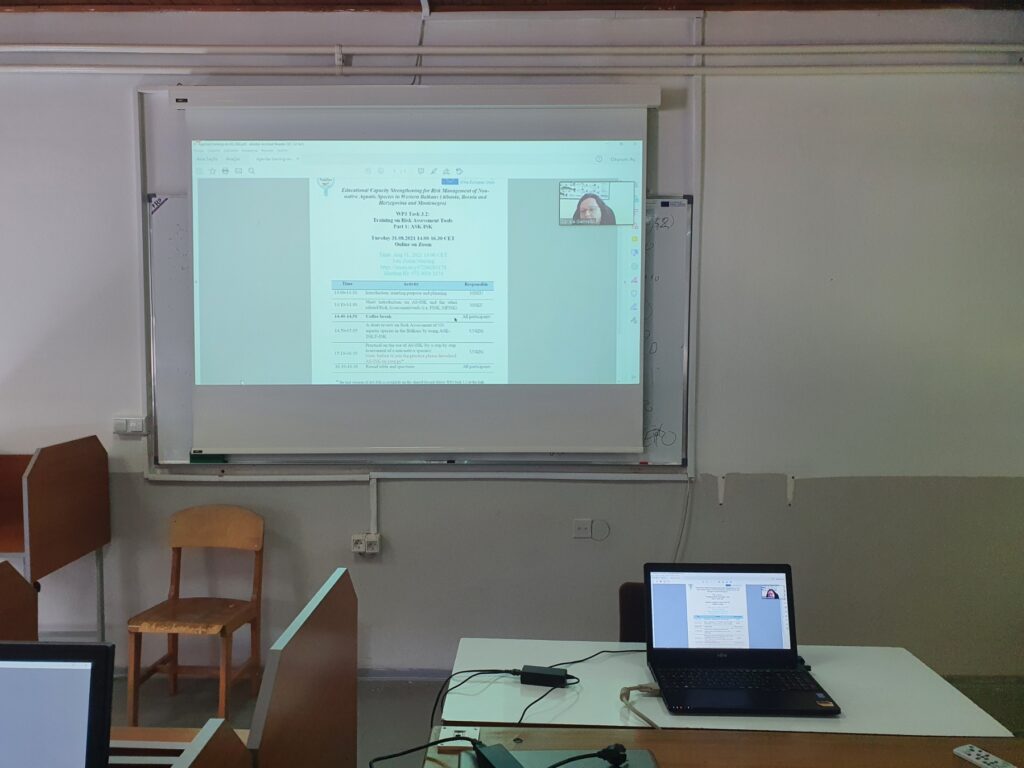
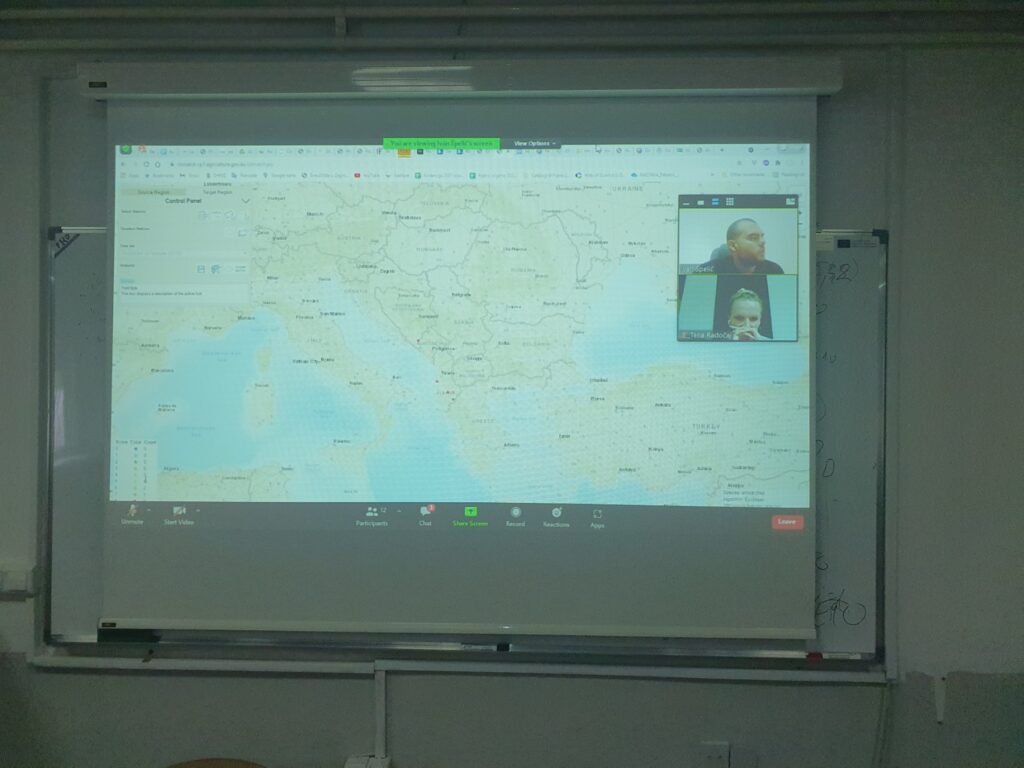
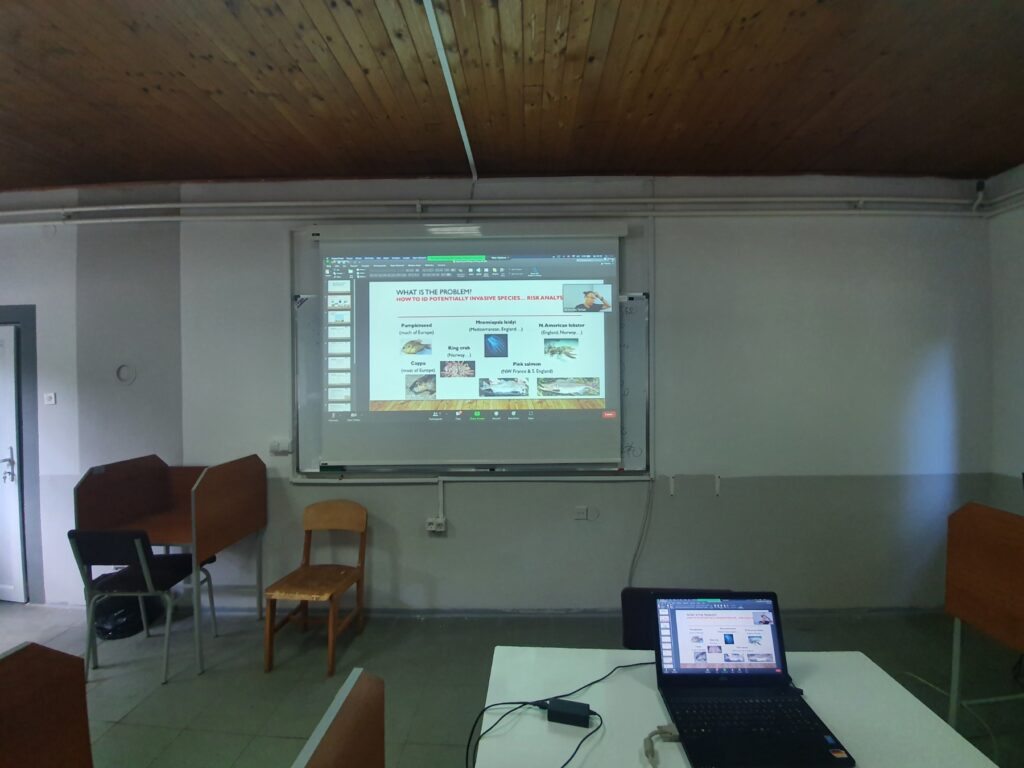
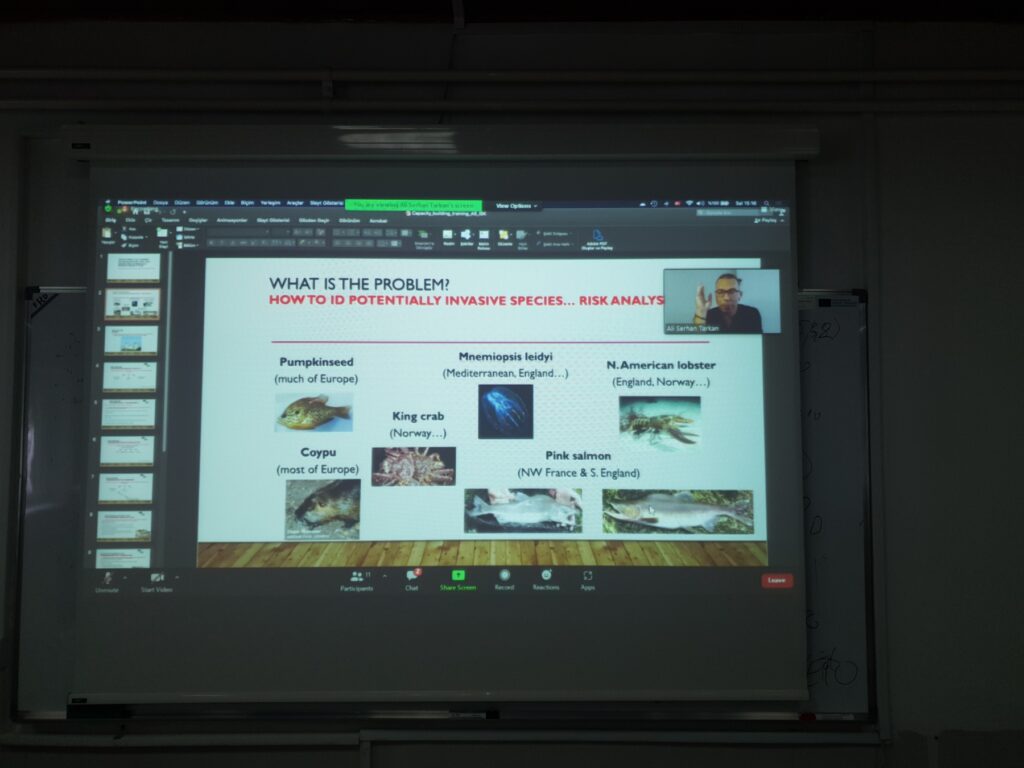
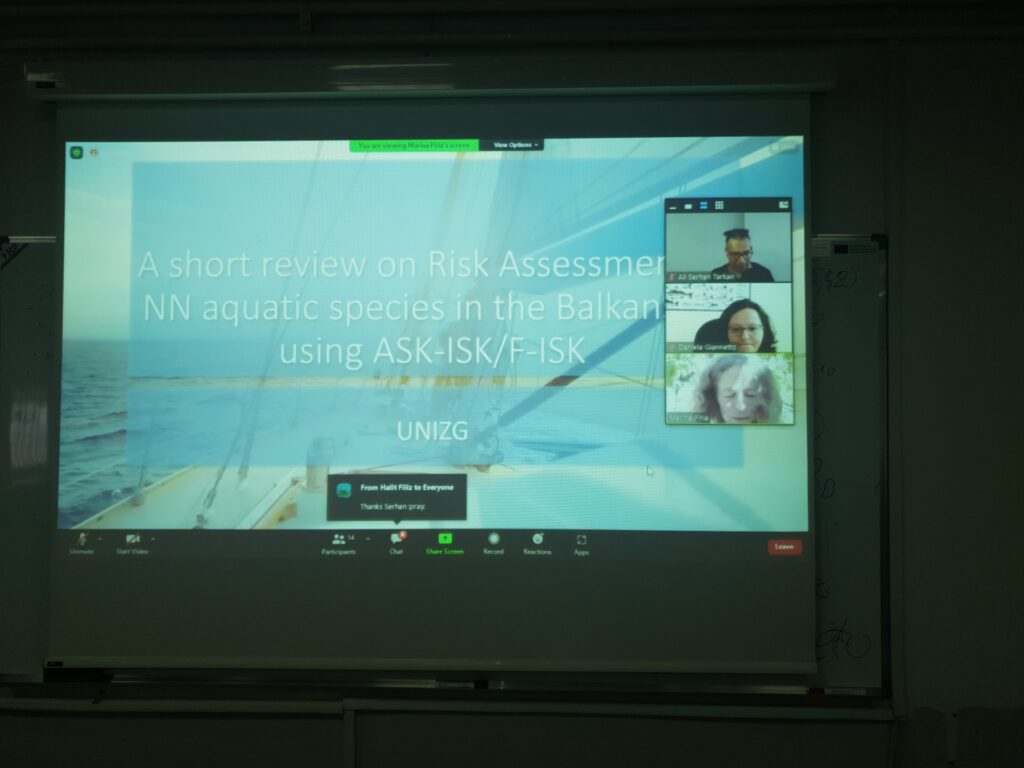
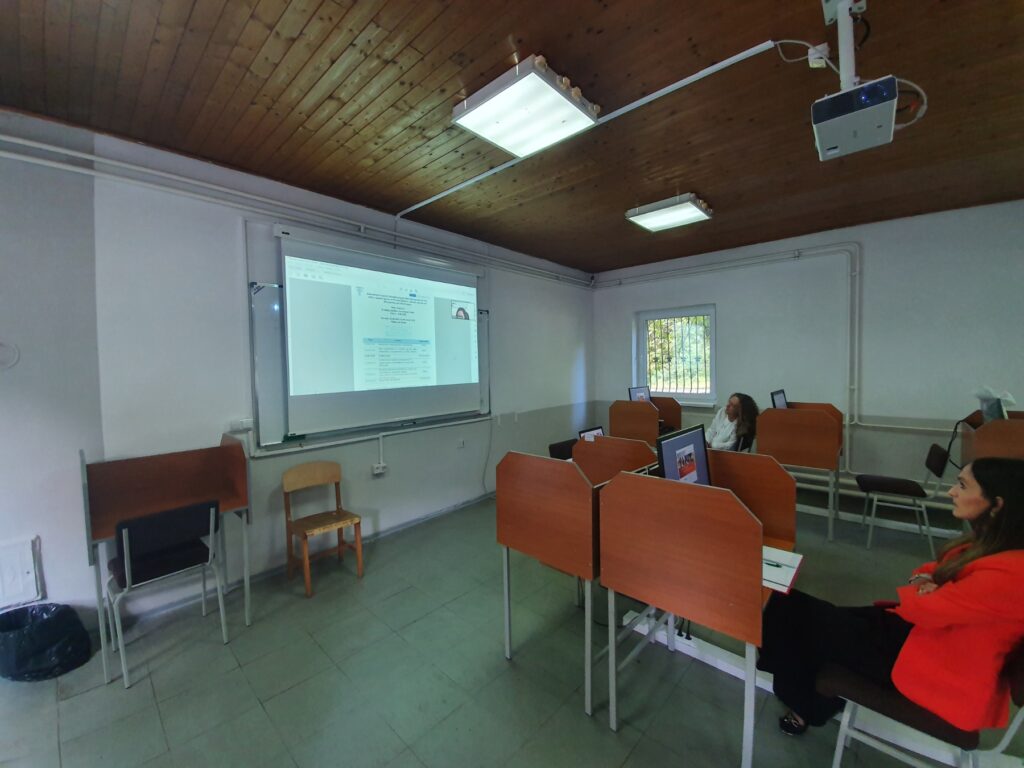
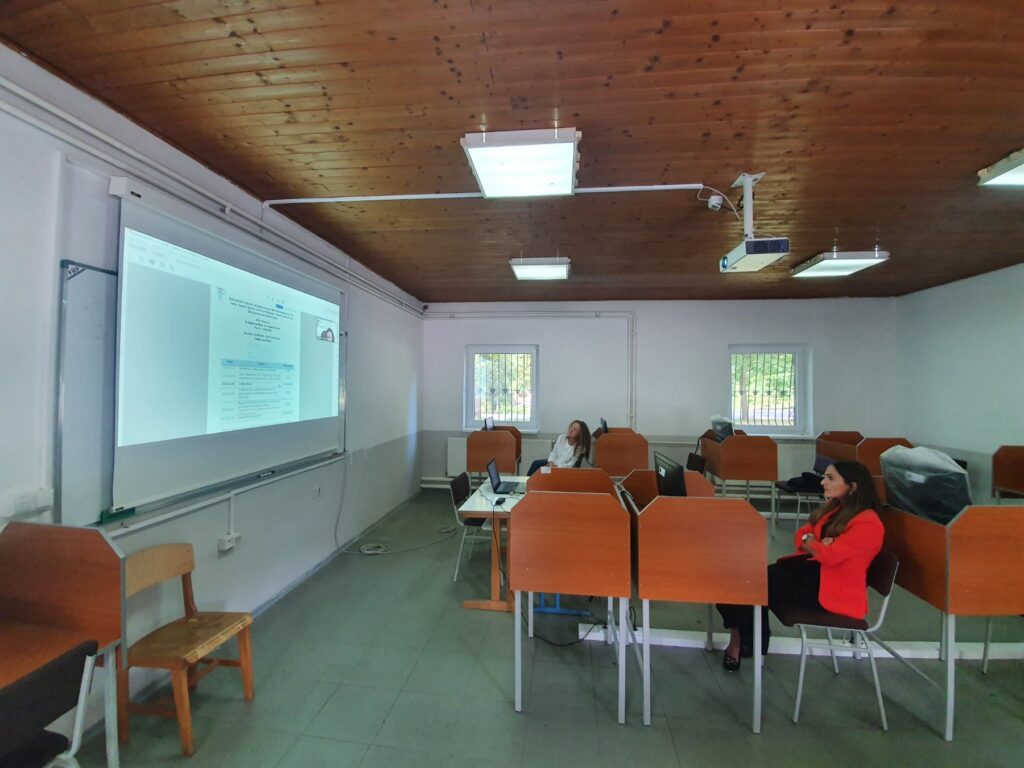
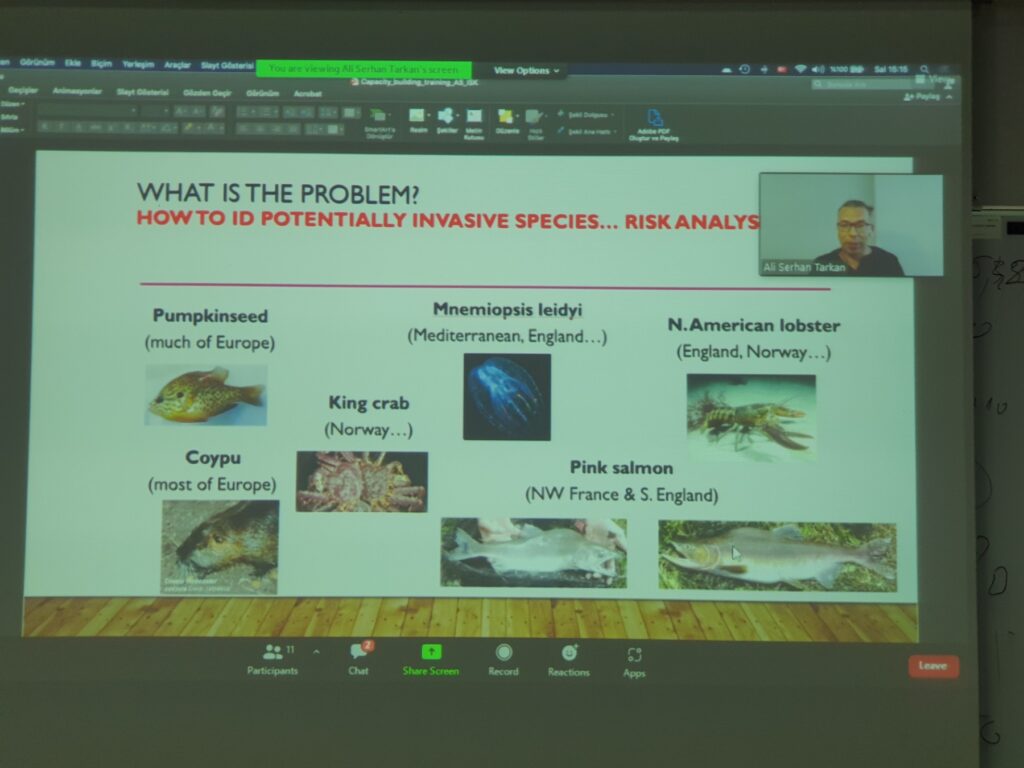
______________
RiskMan meeting about invasive and horizon aquatic species in Bosnia and Herzegovina.
Published 23 June 2021
A meeting among two RiskMan partner universities, University of Sarajevo and University of Bihać, was held on 23th of June and chaired by Prof. Marina Piria, PhD, from University of Zagreb. The aim of the meeting was to review the list of invasive aquatic species in Bosnia and Herzegovina. In addition to invasive species, the list includes horizon species (species that are currently being discovered in some of the neighboring countries and which could soon be found in our country as well). It is important to pointout that this is the first decisive list of invasive aquatic species in our country so far, and as such it will give a good insight when it comes to the possibilities of monitoring invasive species in our country.
Dana 23.06.2021. godine s početkom u 13 sati održan je sastanak UNBI sa UNSA a koji je vodila dr. sc. Marina Piria iz Zagreba. Cilj sastanka je bio pregled popisa invazivnih akvatičnih vrsta u Bosni i Hercegovini. Pored invazivnih vrsta na popisu su se našle horizon vrste (vrste koje su trenutno otkrivene u nekim od susjednih zemalja i koje bi u skorije vrijeme se mogle nađi i kod nas). Bitno je istaći da je ovo do sada prvi popis o invazivnim akvatičnim vrstama u našoj zemlji, i kao takav dat će dobar uvid kada je riječ o mogućnostima praćenja invazivnih vrsta u našoj zemlji.
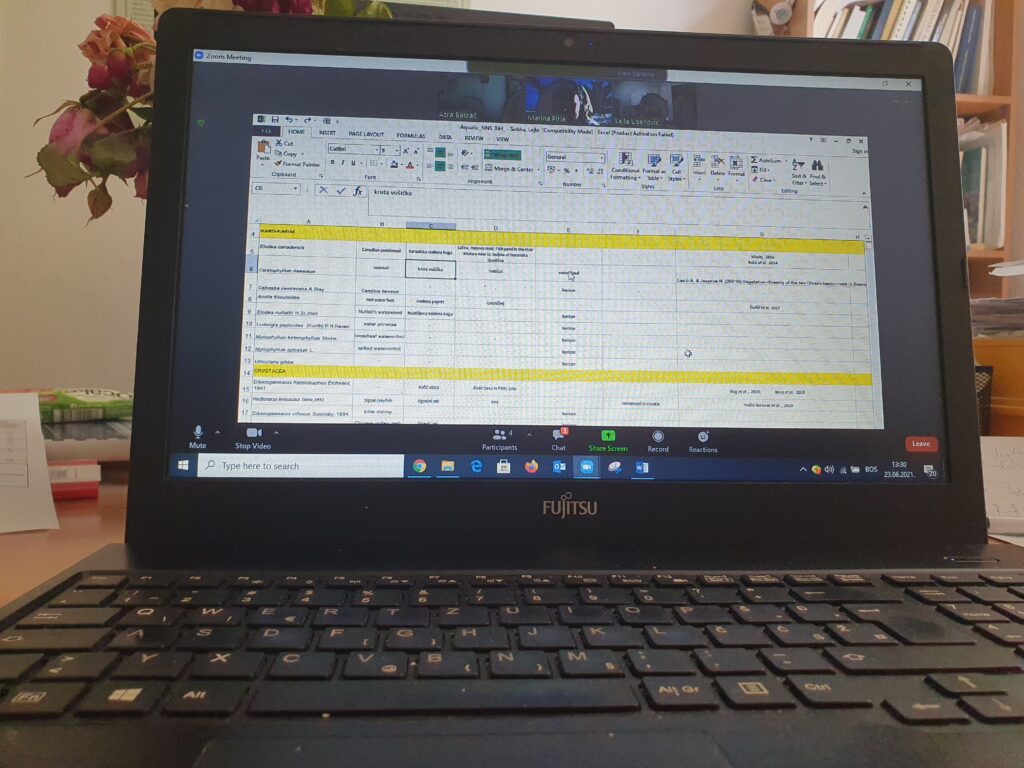
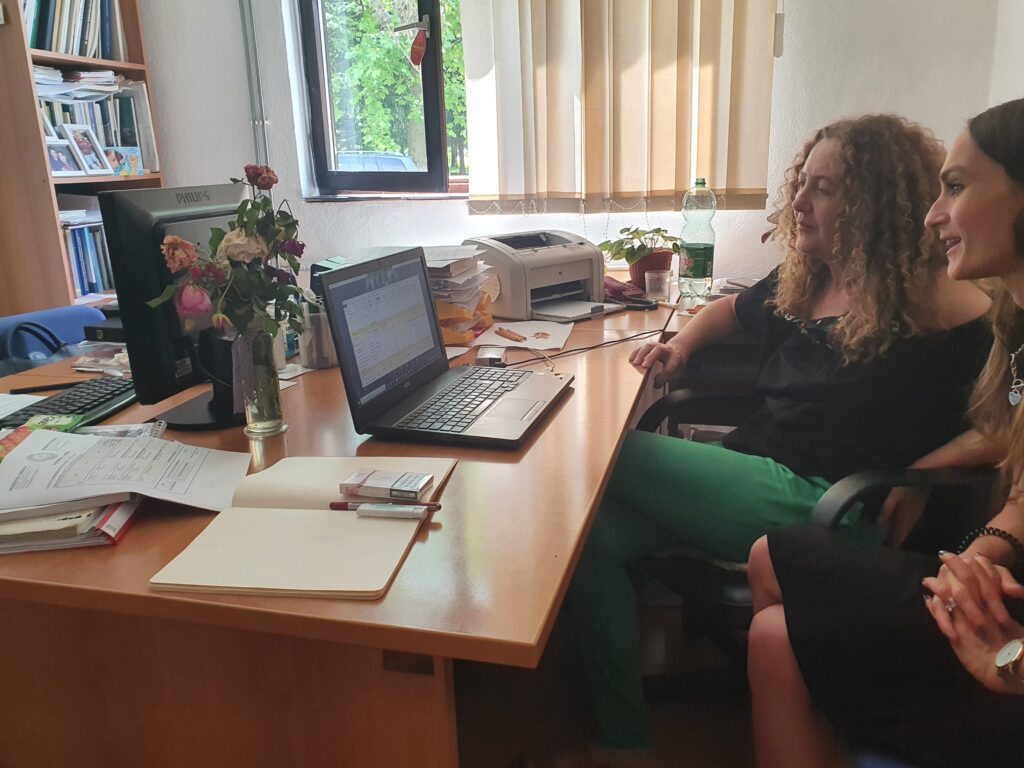
____________
RiskMan Steering Committee e-Meeting
Published 22 April 2021
RiskMan Steering Committee e-Meeting was done on Zoom on April 21, 2021. All the RiskMan Partners coordinated by the Project Coordinator MSKU and by UNIPA (leader of WP3) have discussed the results of the first two WPs and planned the future activities.
Online sastanak Upravnog odbora Erasmus+ RiskMan-a održan je na putem Zoom-a 21. aprila 2021. Kao predstavnici Univerziteta u Bihaću i članovi UNBI RiskMan tima sastanku su prisustvovali Prof. dr. Azra Bakrač i doc. dr. Emir Mujić. Na sastanku su anlizirane dosadašnje aktivnosti i rezultati prva dva WP-a, te planiranje budućih aktivnosti.
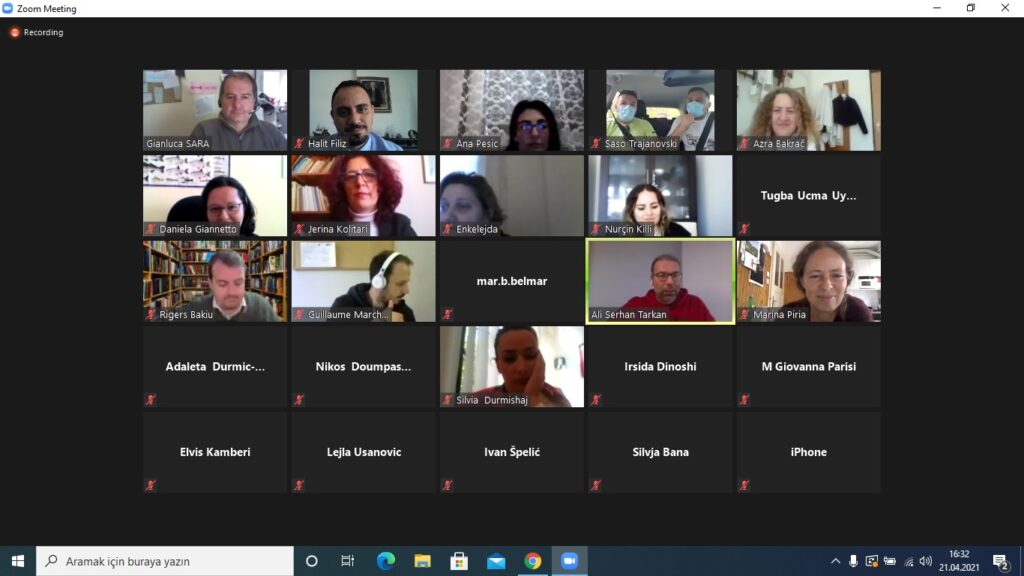
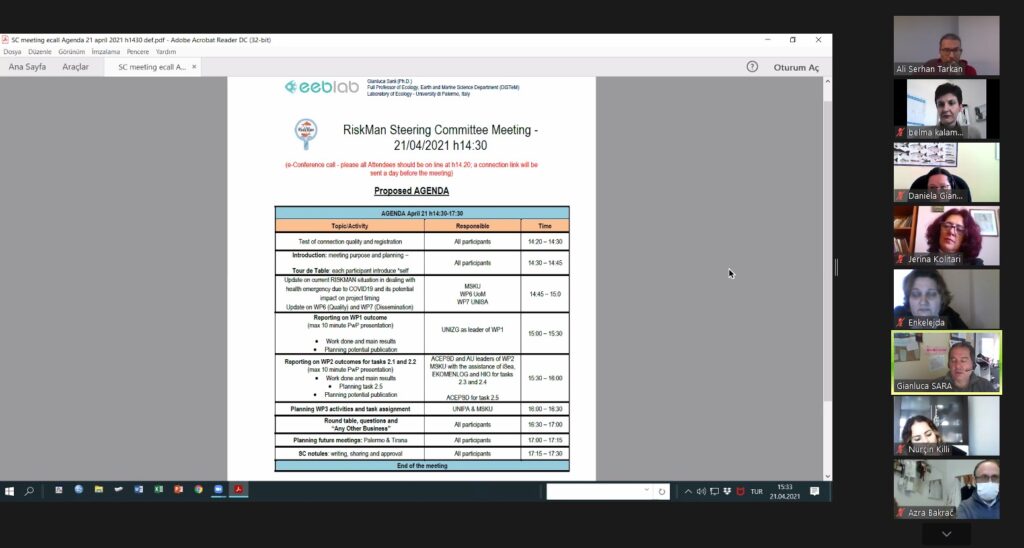
_____________
Internal meetings of the UNBI RiskMan team
Published 26 February 2021
For the purpose of planning, implementing activities and goals under the Erasmus+ project RiskMan, UNBI RiskMan team continuously holds internal meetings. Meetings are held at the Biotechnical Faculty of the University of Bihać.
Interni sastanci UNBI RisMan tima
U svrhu planiranja te provođenja aktivnosti i ispunjenja ciljeva u okviru Erasmus+ projekta RiskMan predstavnici Univerziteta u Bihaću u konzorciju navedenog projekta redovno održavaju interne sastanke na Biotehnčkom fakultetu Univerziteta u Bihaću
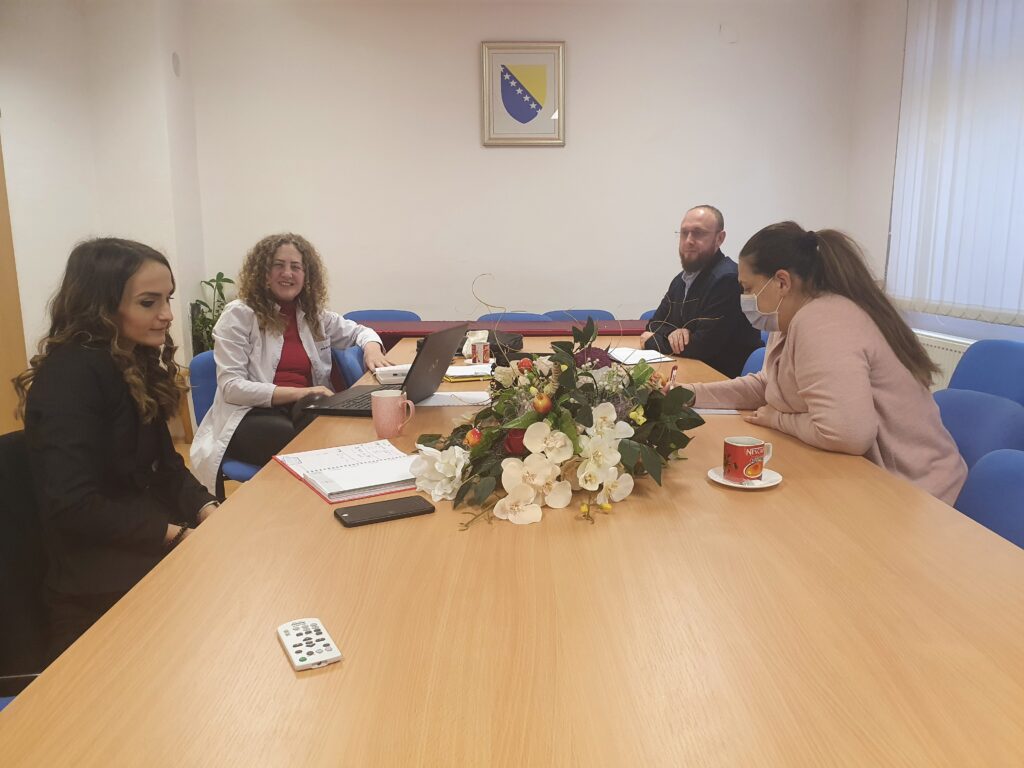
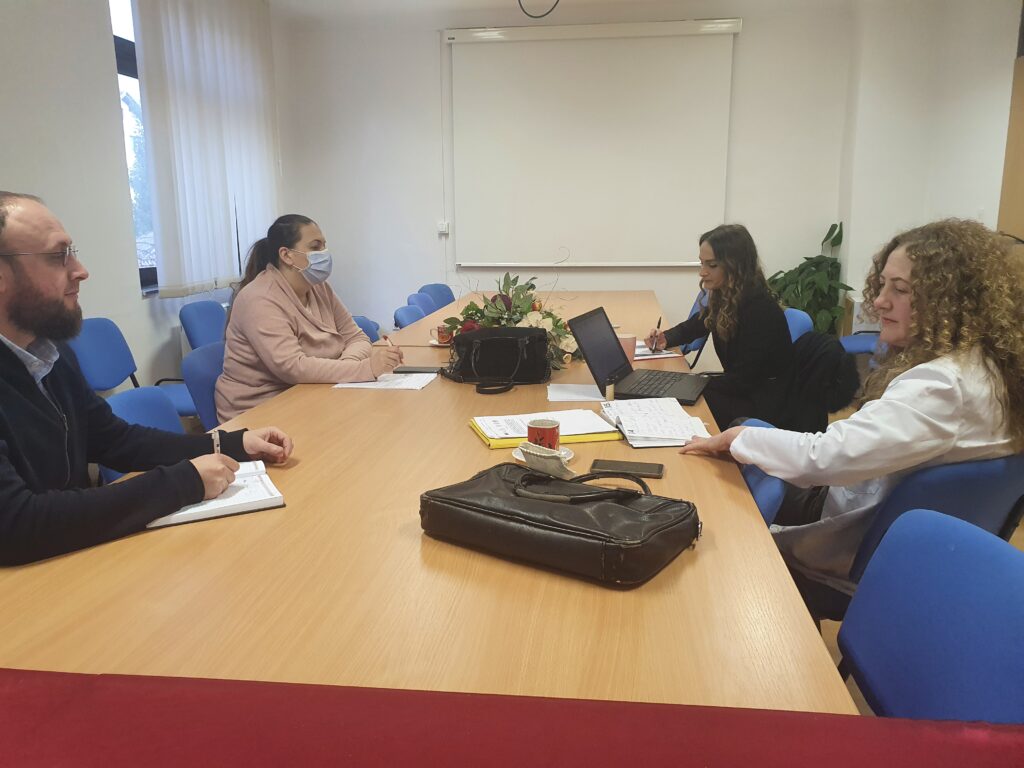
_____________
Erasmus+ RiskMan Updating Meeting
Published 19 February 2021
A Consortium Erasmus+ RiskMan Updating Meeting was held on Thursday, 18th of February 2021. The online meeting was coordinated by Muğla Sıtkı Koçman University (Turkey) and was attended by all project partners.The topic of the meeting were issues related to the process of finalizing and signing Partnership Agreement, current status of Work Packages 1 and 2 and implementation of redesigned WP5 as well.
University of Bihać was represented by Prof. As. Emir Mujić, MA Subha Džafić, Senior Assistant and Nermina Badić – Office for Academic and Student Affairs at University of Bihać.
Erasmus+ RiskMan Updating Meeting
U organizaciji Muğla Sıtkı Koçman University (R Turska), kao koordinatora Erasmus+ projekta RiskMan, 18. februara 20201. godine održan je online „RiskMan Updating Meeting”. Na sastanku je razgovarano o finaliziranju procedure i potpisivanju Partnerskog ugovora, o trenutnom statusu radnih paketa 1 i 2, kao i o implementaciji redizajniranog radnog paketa 5.
U ime Univerziteta u Bihaću sastanku su prisustvovali članovi projektnog tima: doc. dr. Emir Mujić, MA Subha Džafić, viši asistent i Nermina Badić iz Ureda za nastavu i studentska pitanja Univreziteta u Bihaću.
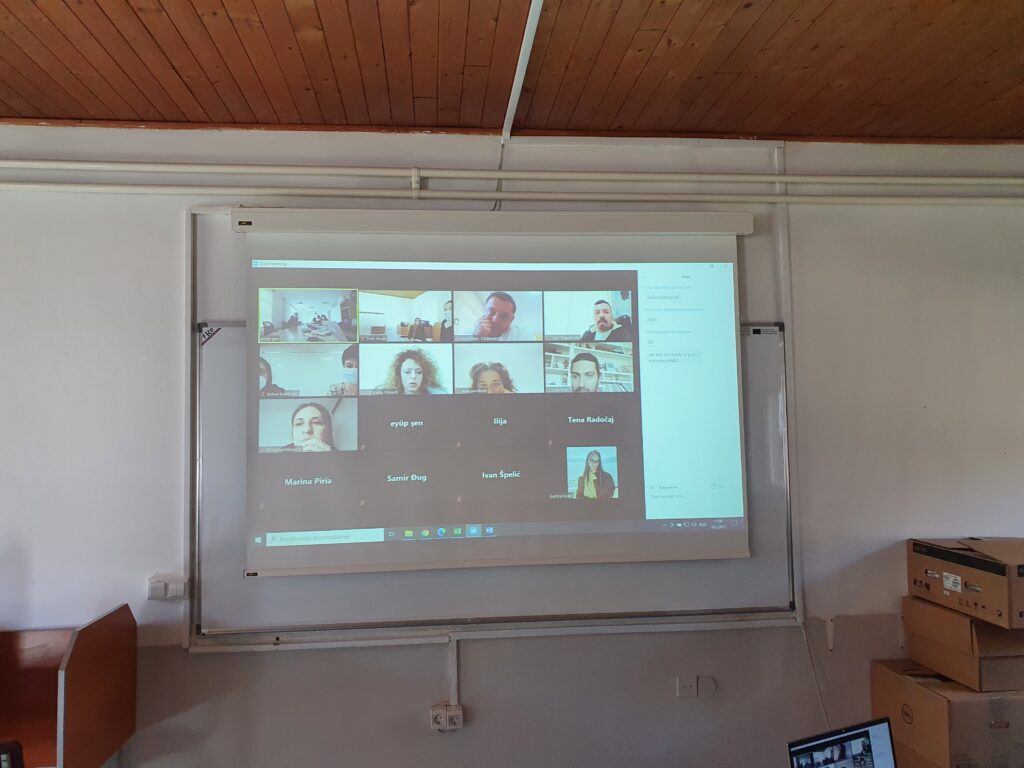
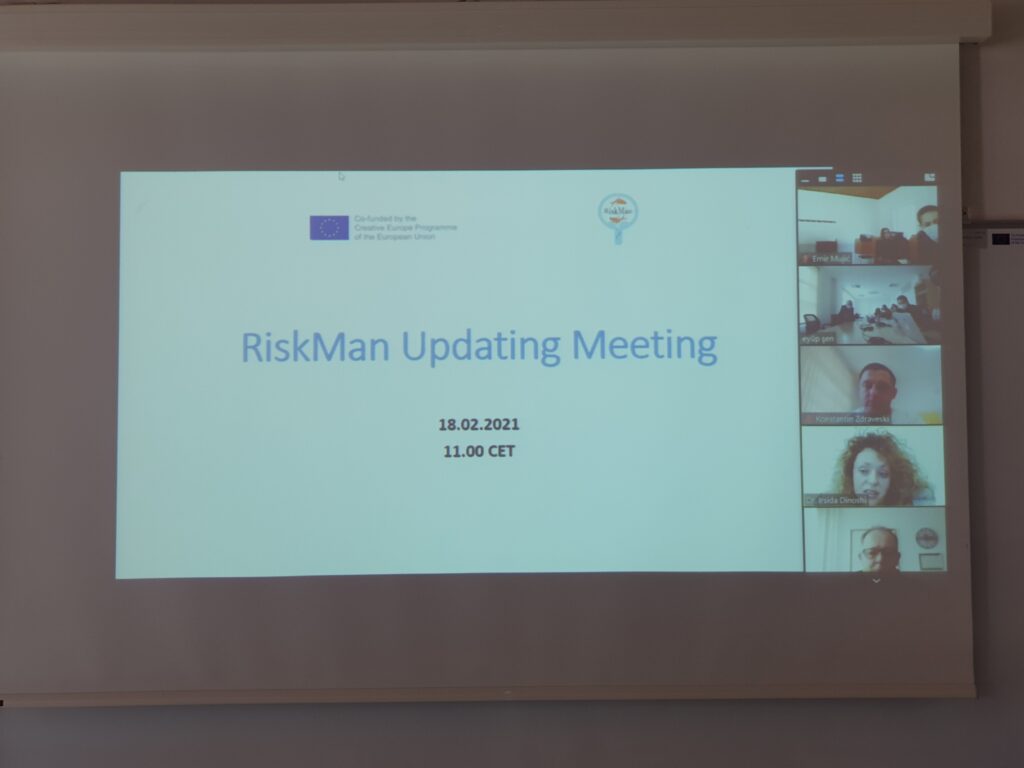
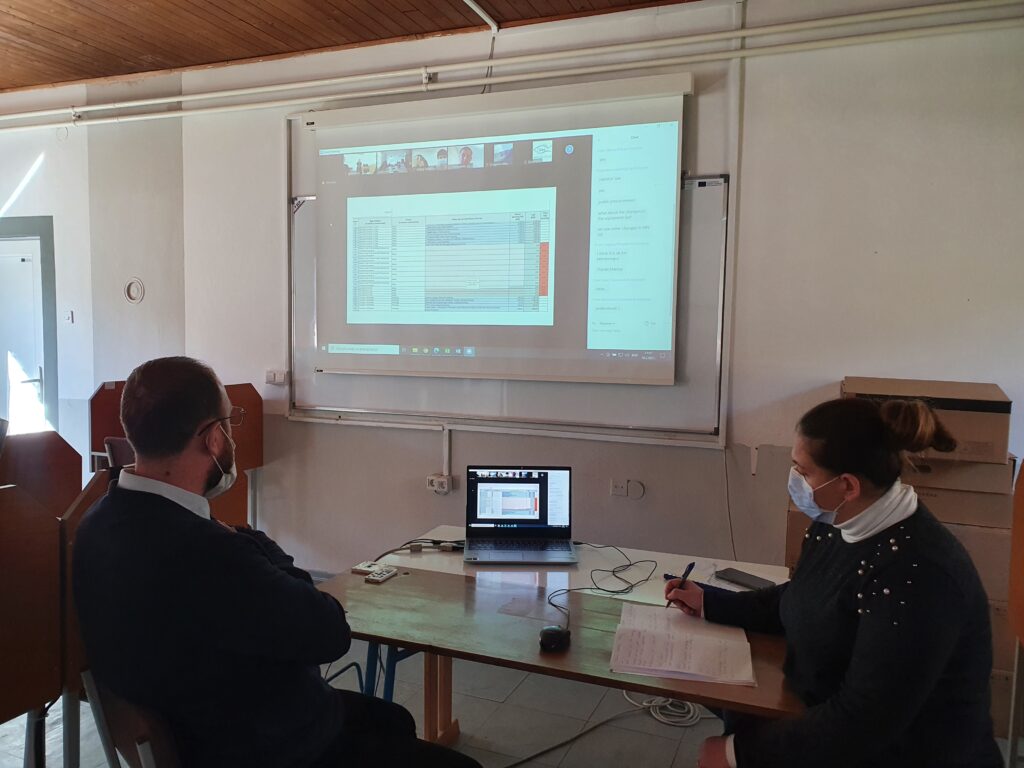
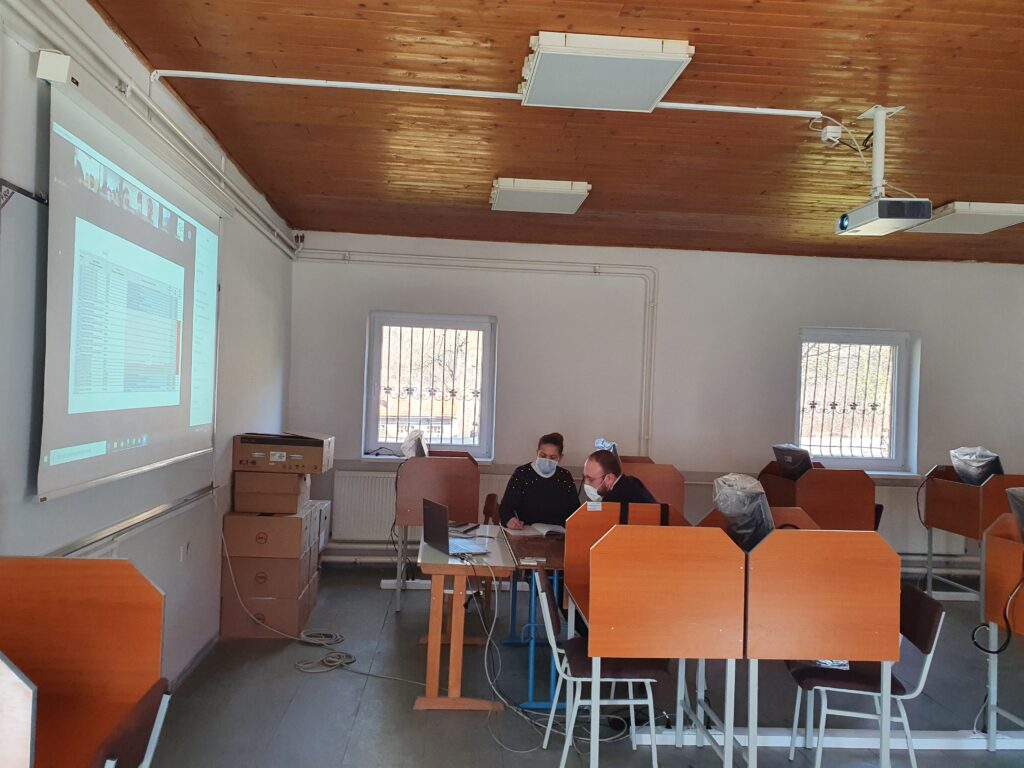
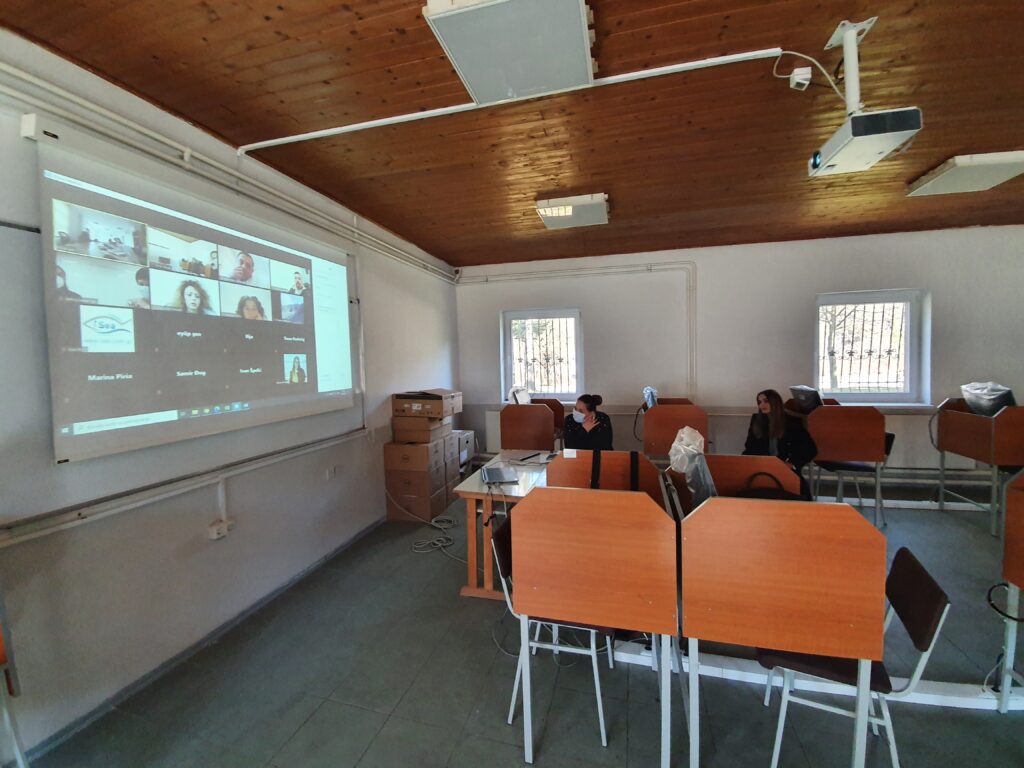
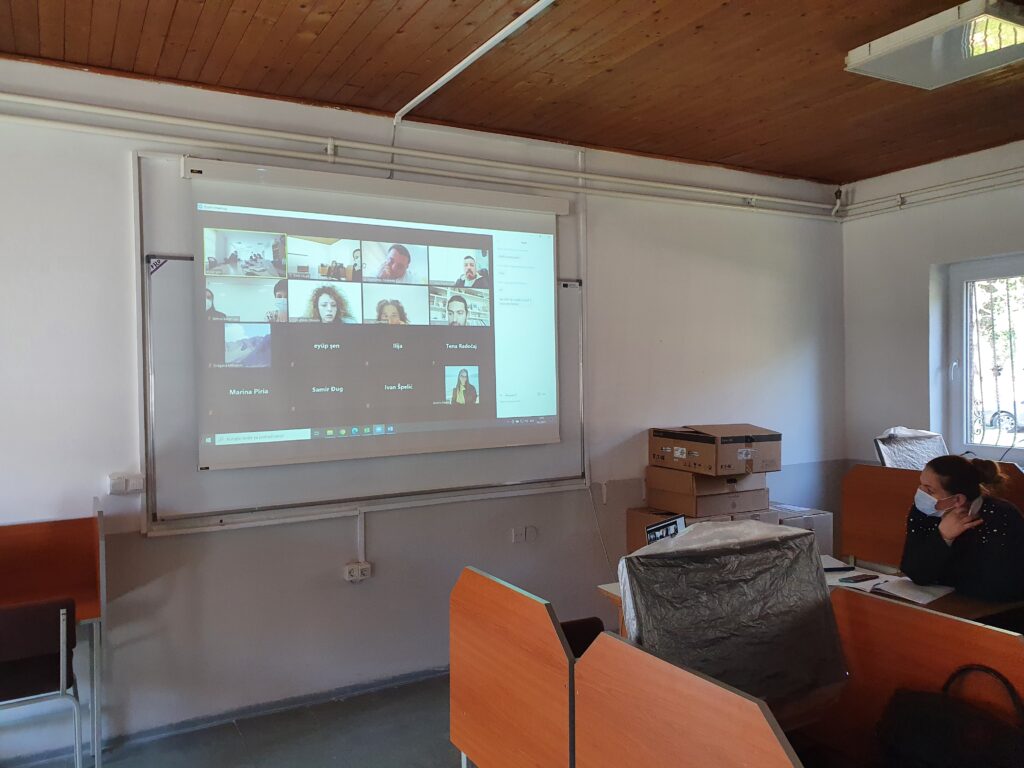
_____________
Online Grantholder’s meeting – Bilateral meeting with EACEA Project Officers
Published 05 February 2021
University of Bihać (UNBI) as representative from one of the beneficiary institutions located in a Partner Country together with the Erasmus+ RiskMan project coordinator Muğla Sıtkı Koçman University MSKU (Turkey) participated in the Bilateral meeting within “Online Grantholder’s meeting” for all projects granted by Erasmus+ CBHE in 2020 hosted by the Education, Audiovisual & Culture Executive Agency (EACEA) from January 25 – 29, 2021. Online bilateral meetings with EACEA representatives – project officers Giulia MORO and Danielle PICOT, were held on January 28th and February 4th, 2021. On behalf of University of Bihać the online meetings were attended by UNBI RiskMan team: Prof. Asoc. Azra Bakrač, Prof. Ass. Emir Mujić, MA Subha Džafić – Senior Assistant and Nermina Badić – Office of Academic and Student Affairs at UNBI.
Bilateralni sastanci sa projektnim službenicima EACEA
Univerzitet u Bihaću kao predstavnik institucija iz partnerskih zemalja u projektu Erasmus+ CBHE RiskMan zajedno sa koordinatorom projekta Muğla Sıtkı Koçman Univerzitetom – MSKU (Turkey) uzeo je učešće u bilateralnim sastancima organiziranim u okviru “Online Grantholder’s meeting” za sve odobrene projekte iz programa Erasmus+ CBHE za 2020 godinu. Domaćin ovih aktivnosti je bila Izvršna agencija za obrazovanje, audiovizuelnu i kulturu Evropske komisije (EACEA) od 25. do 29. januara 2021. godine. Online bilateralni sastanci sa predstavnicima EACEA – projektnim službenicima Giulia MORO and Danielle PICOT održani su 28. januara i 04. februara 2021. godine. Kao predstavnici Univerziteta u Bihaću sastancima su prisustvovali članovi UNBI RiskMan tima: prof. dr. Azra Bakrač, doc. dr. Emir Mujić, MA Subha Džafić – viši asistent i Nermina Badić – Ureda za nastavu i studentska pitanja Univerziteta u Bihaću.
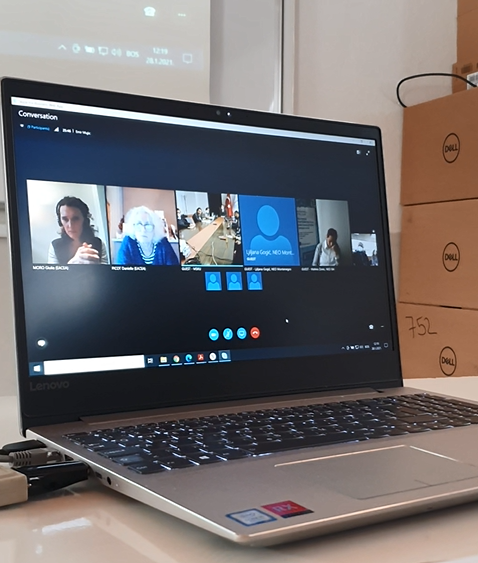
_____________
Erasmus+ Capacity Building in Higher EducationOnline Grantholders´Meeting 25-29 January 2021
Published 29 January 2021
The Erasmus+ CBHE – Regional Workshop Western Balkans organised by the European Commission. Representatives of the University of Bihać and members of the UNBI team in the consortium of the Erasmus + RiskMan project doc. dr. Emir Mujic, prof. dr. Azra Bakrač and Nermina Badić – Office for Teaching and Student Affairs at UNBI participated in the regional online workshop Erasmus+ CBHE organised by the European Commission for the Western Balkans. The workshop was held on 26 January, 2021.
https://cbhegrantholders2021.eu/
Regionalna radionica Erasmus+ CBHE za zemlje Zapadnog Balkana organizirana od strane Evropske komisije
Predstavnici Univerziteta u Bihaću i članovi UNBI tima u konzorciju projekta Erasmus+ RiskMan doc. dr. Emir Mujić, prof. dr. Azra Bakrač i Nermina Badić – Ured za nastavu i studentska pitanja na UNBI učestvovali su na regionalnoj online radionici Erasmus+ CBHE organiziranoj od strane Europske komisije za zemlje Zapadnog Balkana. Radionica je održana 26.01.2021. godine.
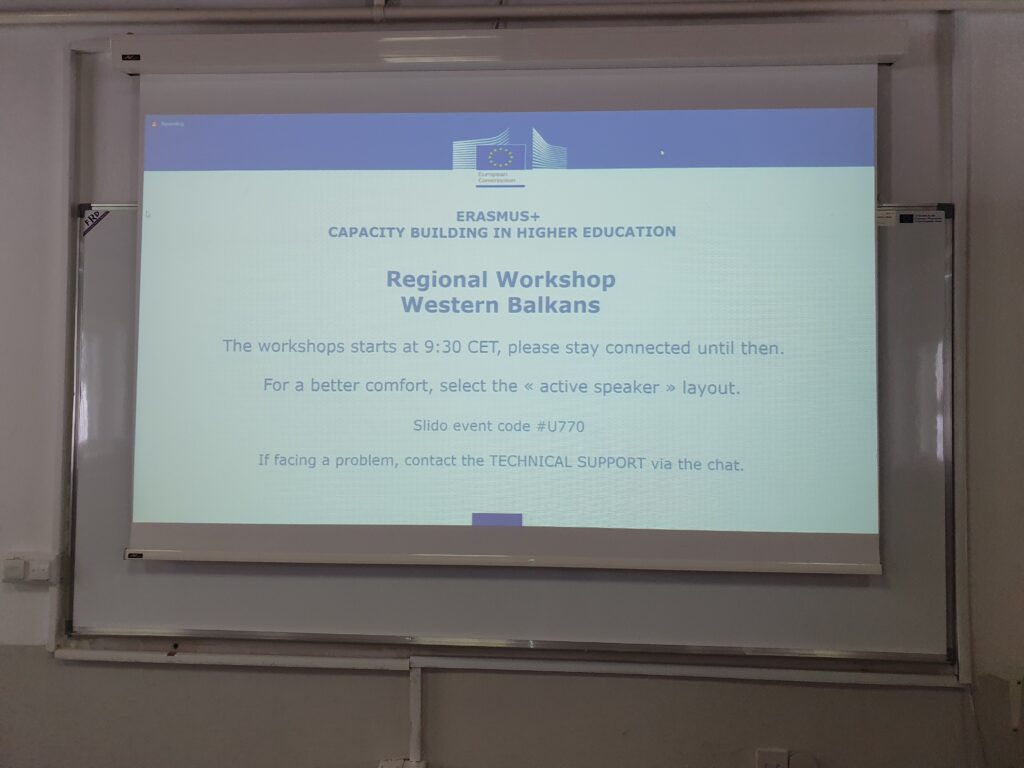
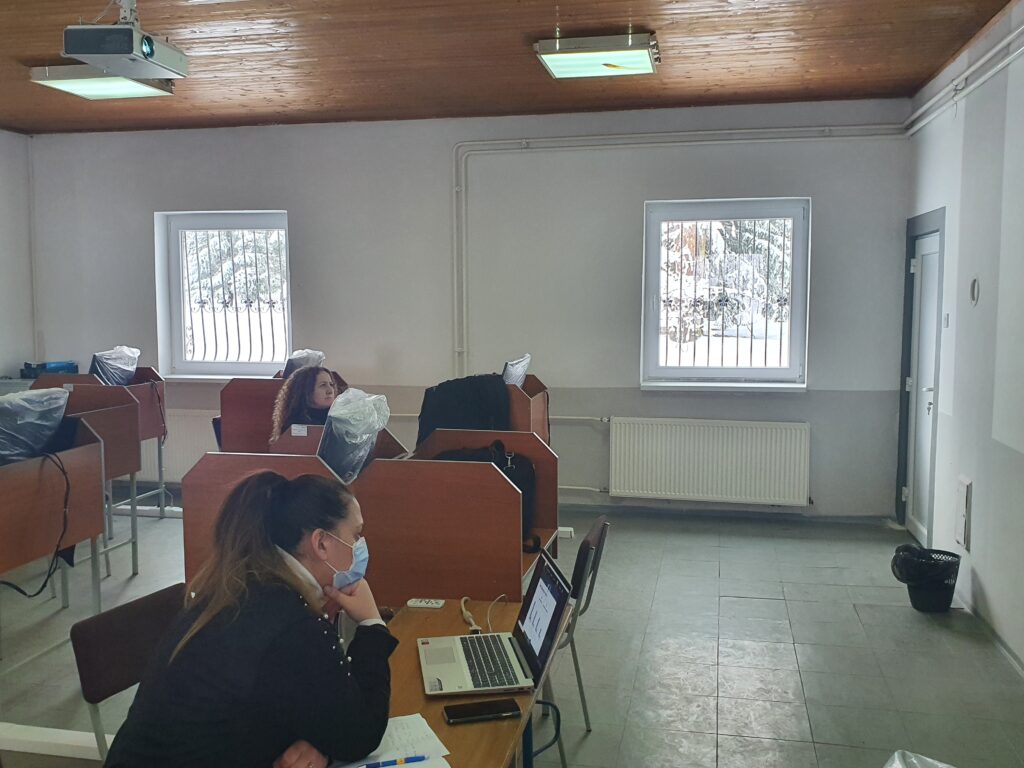
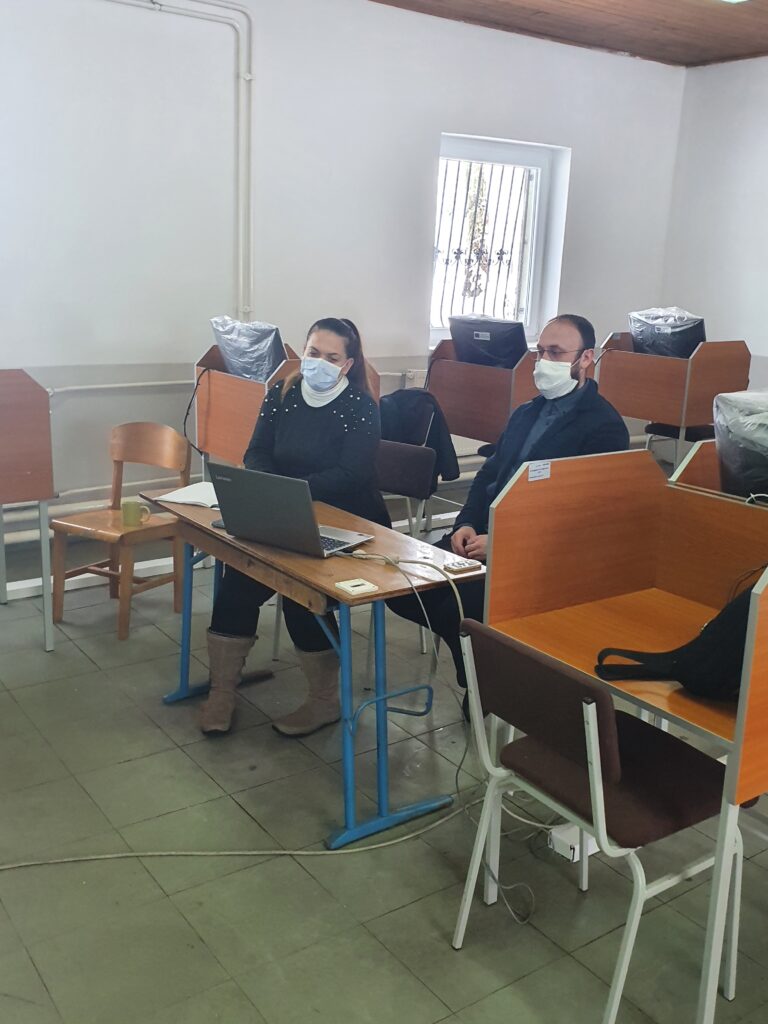
_____________
Erasmus+ RiskMan Kick-Off Meeting, Mugla, Turkey December 10th , 2020
Published 14 December 2020
The official Kick-Off Meeting of the Erasmus+ project RiskMan was held on December 10th, 2020. As coordinating partner of the consortium, Muğla Sıtkı Koçman University (Turkey) invited all project partners to this one day online meeting. The primary objective of the meeting was for all partners to get to know each other in order to create the right conditions to work together for the next 2 years. The UNBI team was represented by Prof. As. Azra Bakrač, Ph.D, MA Subha Džafić, Senior Assistant and Nermina Badić – Office of Academic and Student Affairs at UNBI.
U sklopu aktivnosti Erasmus+ projekta RiskMan u organizaciji Muğla Sıtkı Koçman University (R. Turska) 10. decembra 2020. godine održan je zvanični jednodnevni online Kick-Off Meeting. Ispred UNBI tima sastanku su prisustvovali: prof. dr Azra Bakrač, MA Subha Džafić, i Nermina Badić – Ured za akademska i studentska pitanja na Univrezitetu u Bihaću.
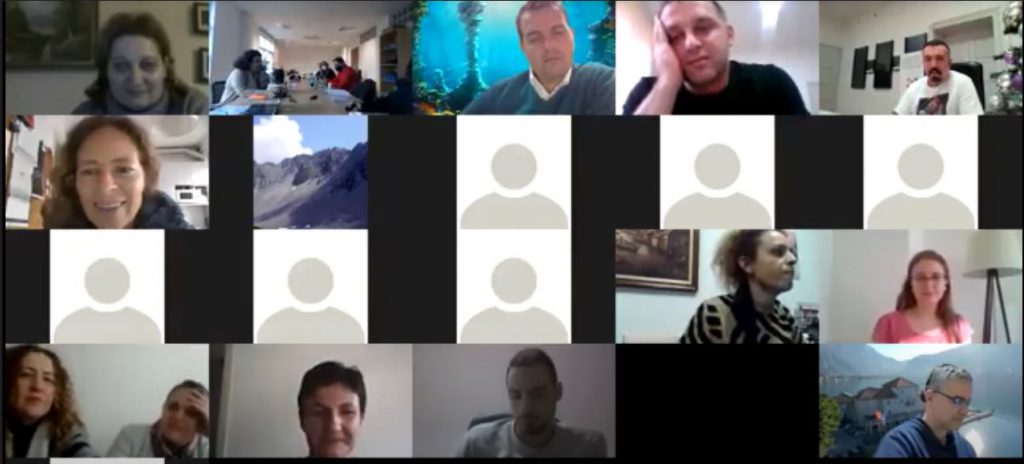
_____________
Newspaper article about the Erasmus + project RiskMan in the Una-Sana newspaper “Krajina” (bs)
Published 11 November 2020
